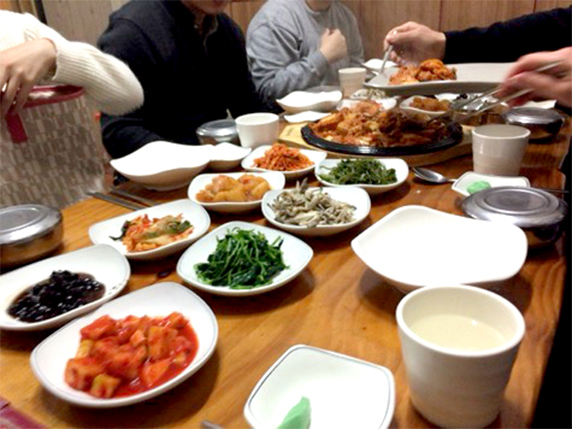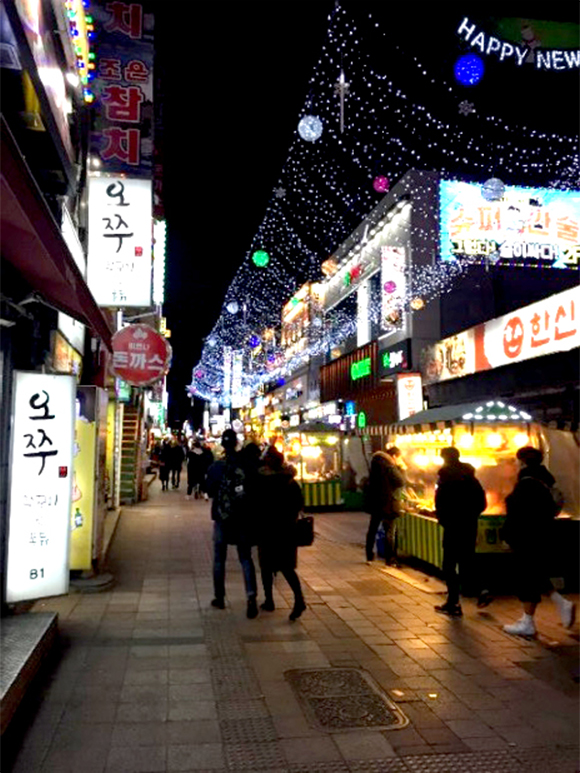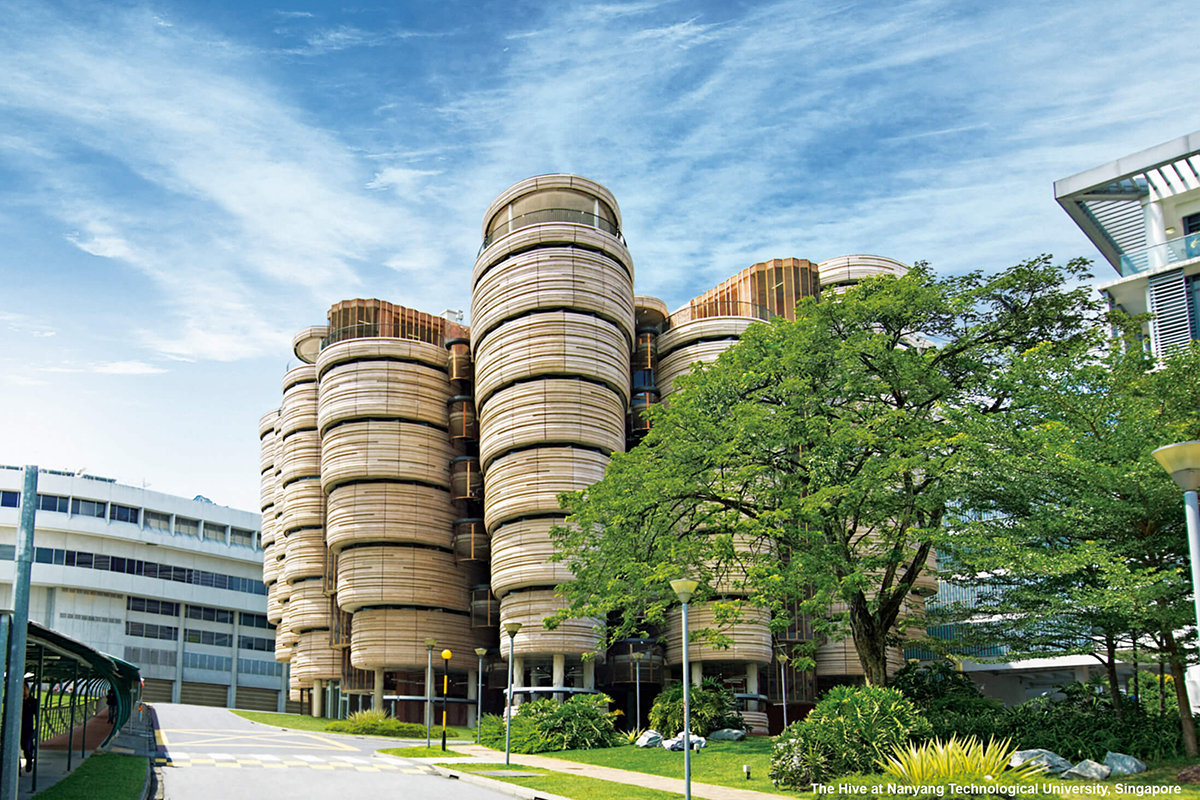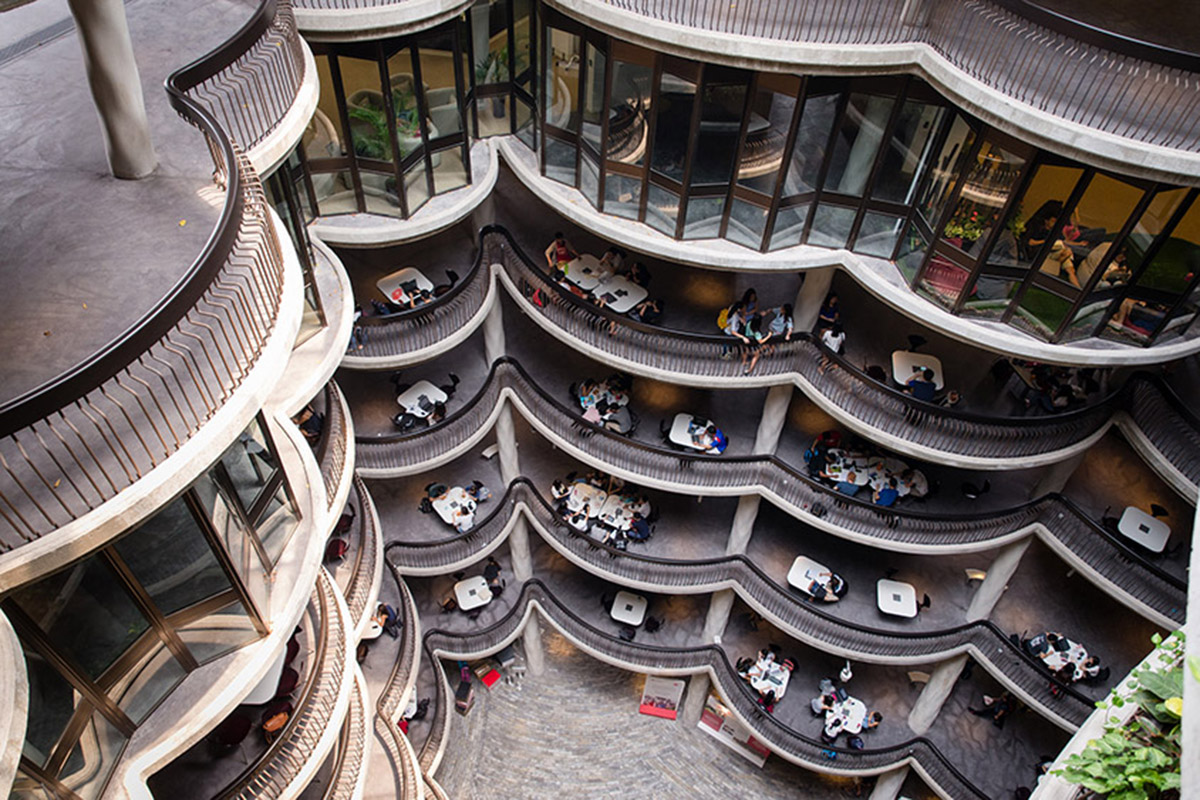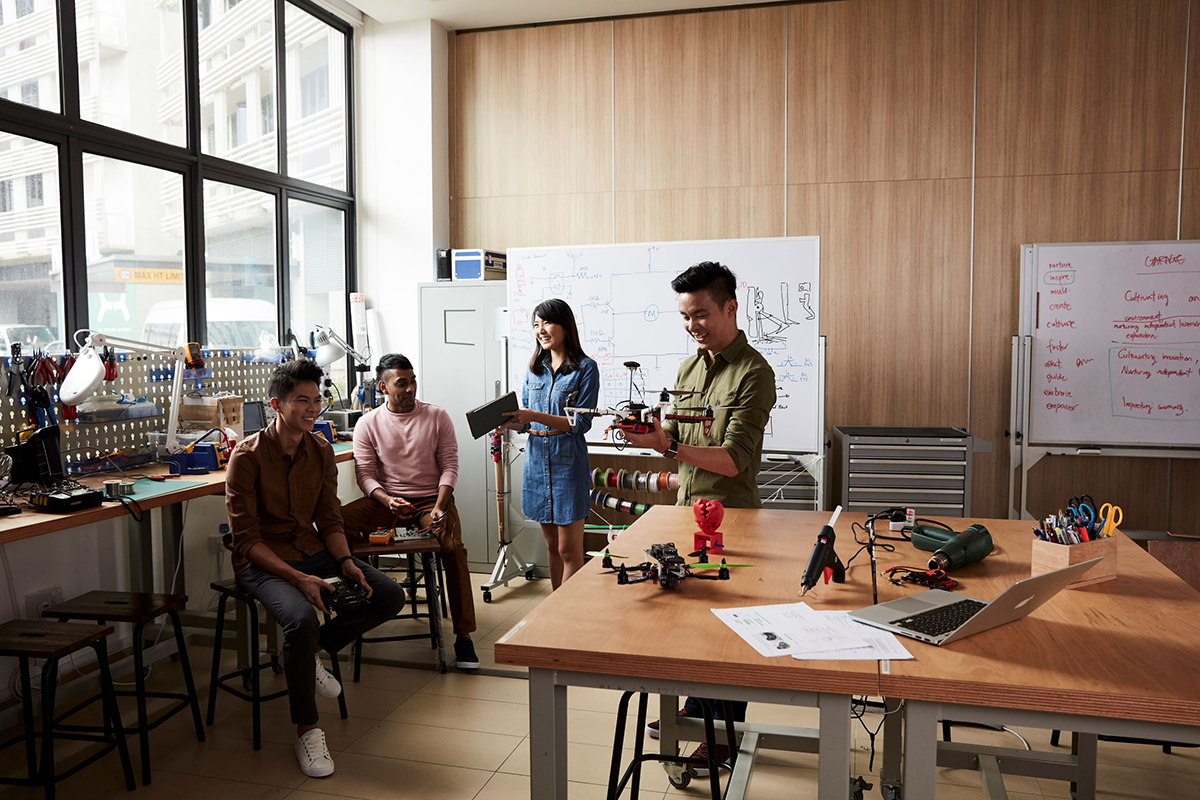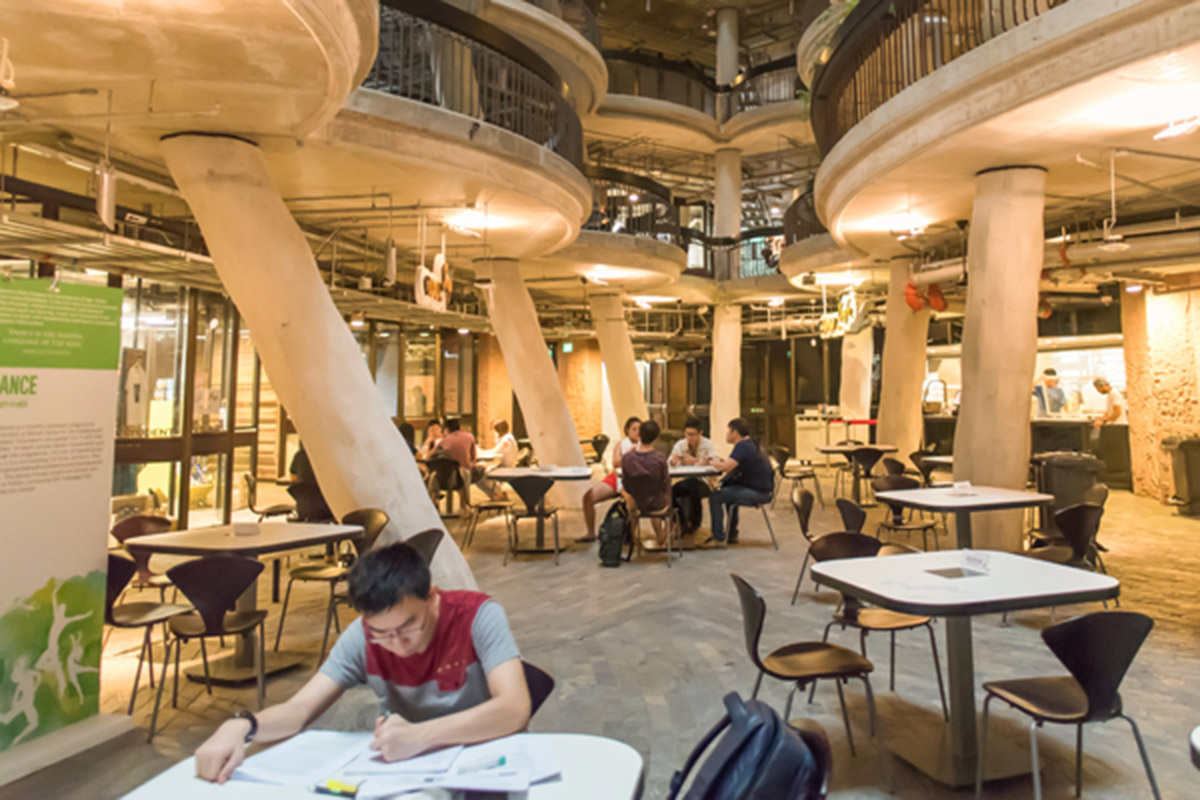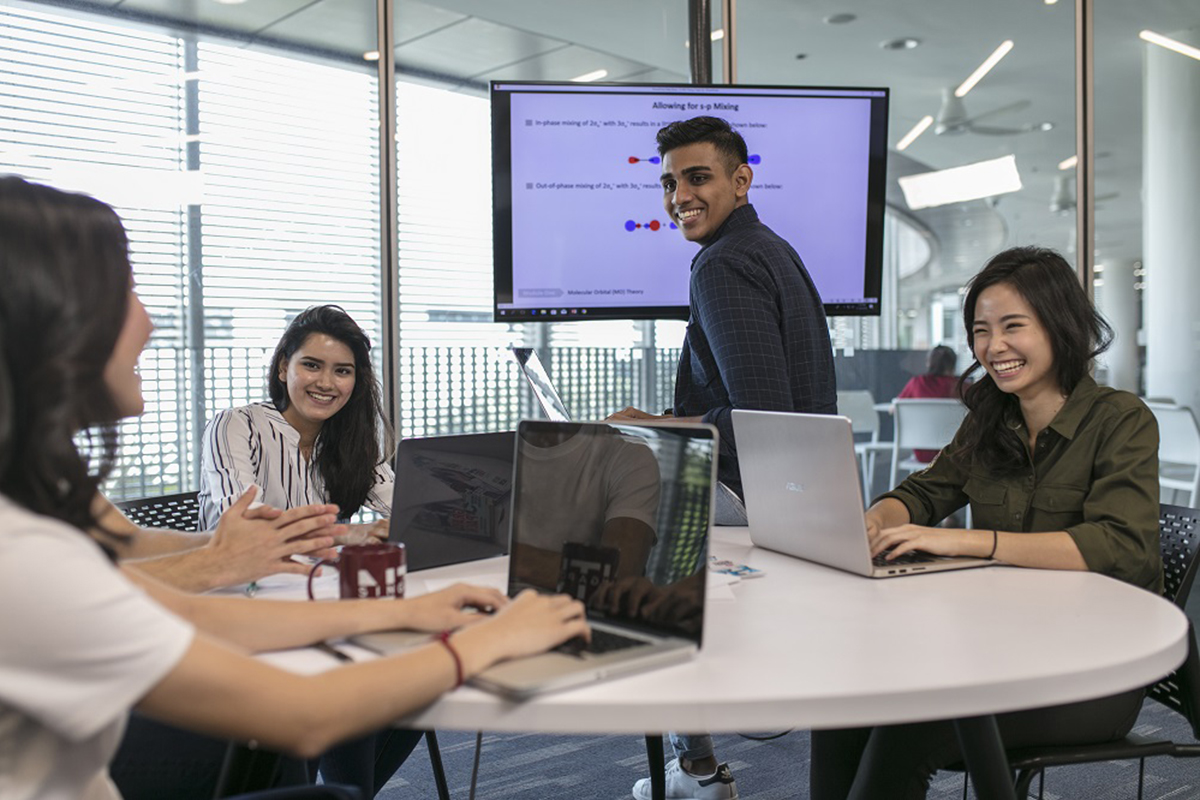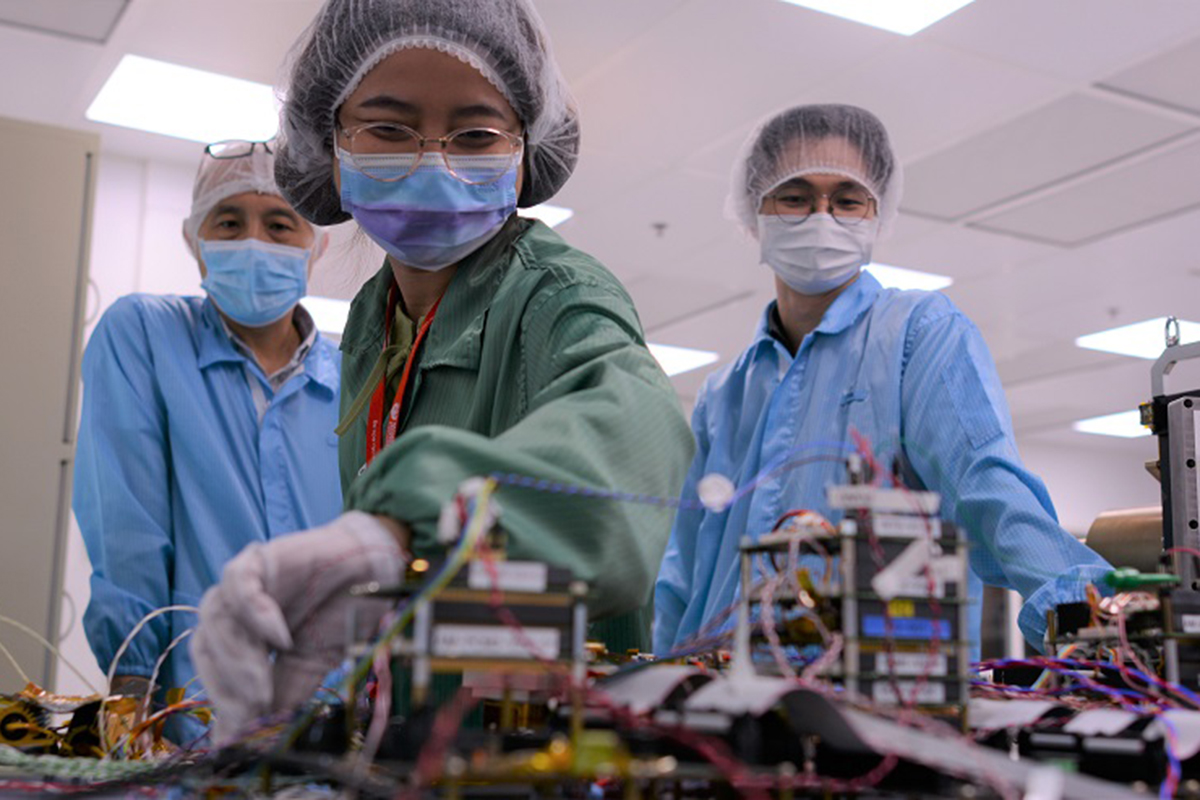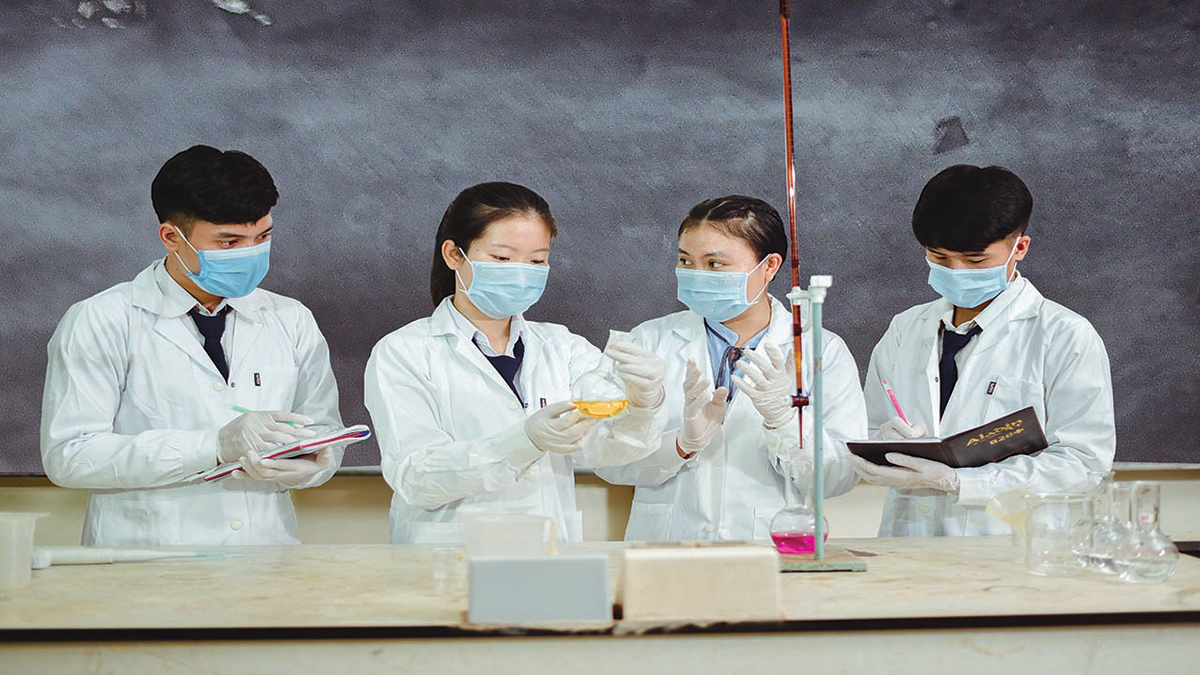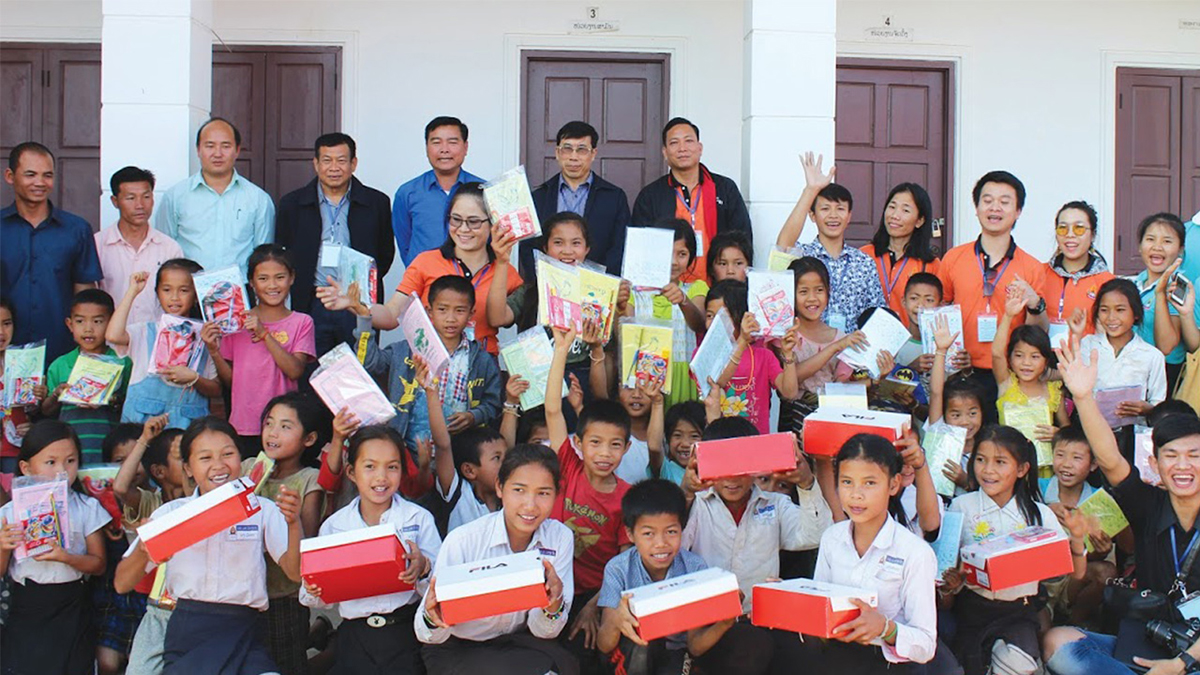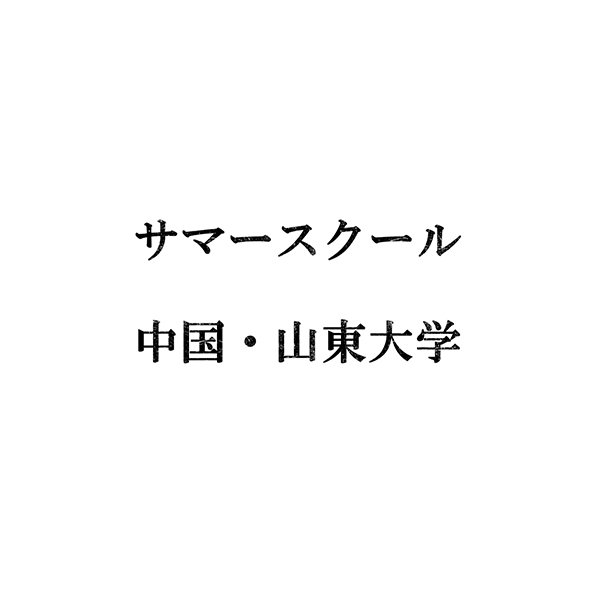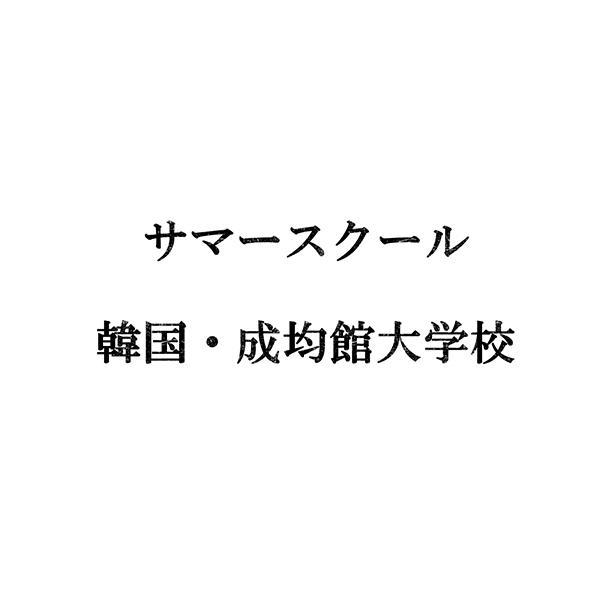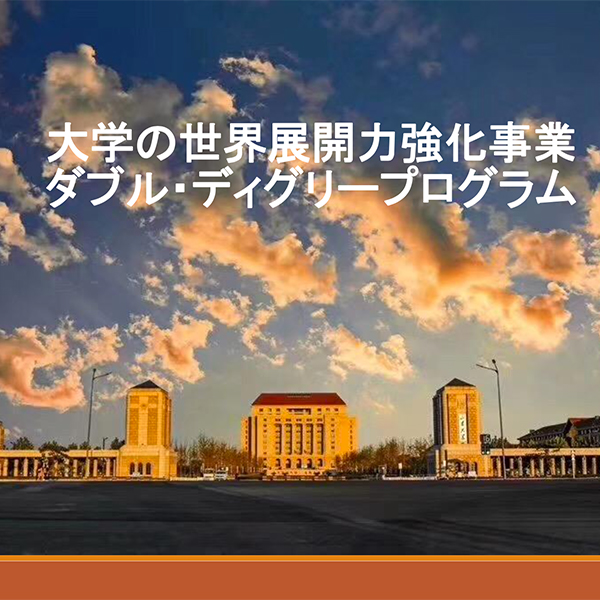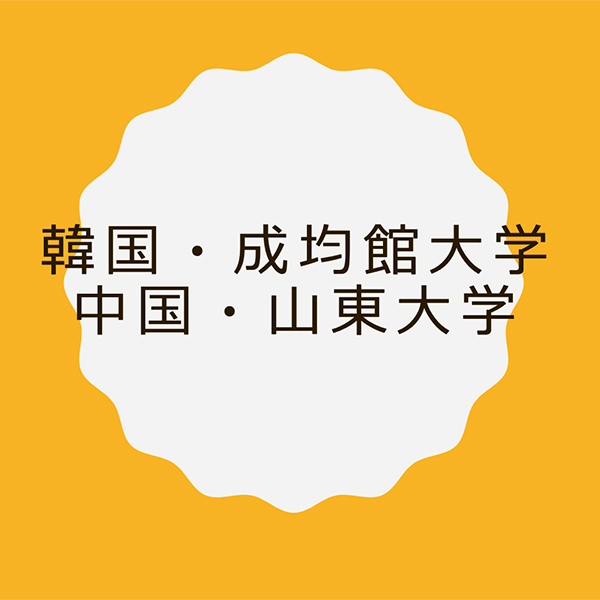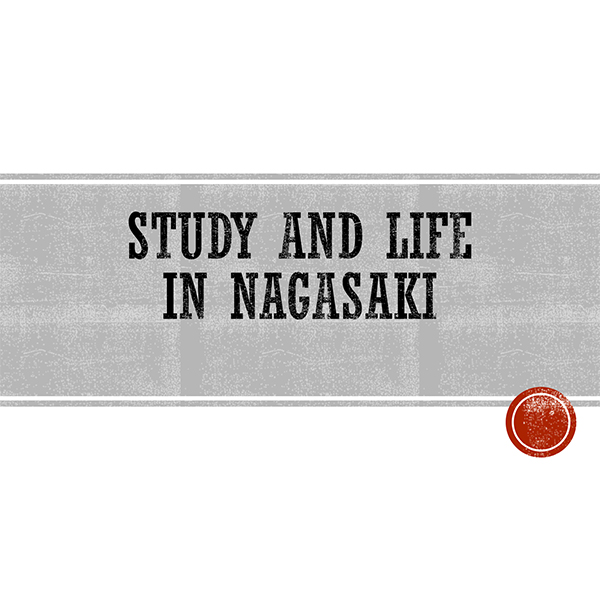Participation Information
The state of infrastructure that supports the social foundation depends on each country’s economic development stage (early growth, rapid growth, maturity, and stagnation). Accordingly, the needs for engineers, such as: maintenance and management of infrastructure, renewal technologies, and new construction technologies, also vary from one country to another. With this in mind, this program aims to develop human resources who can support sustainable infrastructure development that meets the needs of Asian countries from a technical perspective, and who can also play an active role on an international level.
- those who can contribute internationally to the sustainable development of infrastructure that meets the needs of each country in Asia from a technical perspective.
- those who can flexibly adopt the latest technologies, ideas and ways of thinking, so become able to lead and contribute to the development of infrastructure-related technologies.
- those who can understand and cooperate with people from different cultural or ethnic backgrounds to work together in international projects and diverse environments.
- those who can actively and sustainably develop the community formed in CAMPUS Asia


Information
Programs Advantages
– Degrees awarded by each university under the “Double Degree Program”While enrolled at a university in home country, students can obtain the required credits and conduct research activities at host university abroad, and submit theses to each university which will award a degree.
– Credit transfer system is also available for the “ Short-term Exchange ProgramExchange students can stay in Japan, China, or Korea for 6 months and take specialized courses related to social infrastructure development. Internship programs are offered in three countries where credits can be transferred.

Application & Admission Procedure
CAMPUS Asia program consists of three student exchange programs tailored to the needs of students. Based on admission schedule decided by the three universities, and students are recommended to participate according to rigorous selection criteria at each university. The recommended students will then take an entrance examination at the host university, submit application documents and have an online interview. Based on results of these examinations and screening, host university will select students to participate and host in the CAMPUS Asia Program. For more details on admission procedure, please contact the respective university.
| Program | Year | Country | term | Student |
|---|---|---|---|---|
|
Hybrid Short-term Exchange Program
|
22 | Online | 1m | Master J(5),K(5),C(5) S(2) |
| Japan | 1w | |||
| China | 1w | |||
| Korea | 1w | |||
| Singapura | 1w | |||
| Online | 1m | |||
| 23 | Online | 1m | Master J(8),K(8),C(8) ASEAN(S(2),L(2)) |
|
| Japan | 1w | |||
| China | 1w | |||
| Korea | 1w | |||
| Singapura | 1w | |||
| Online | 1m | |||
| 24 | Online | 1m | Master J(8),K(8),C(8) ASEAN(S(2),L(2)) |
|
| Japan | 1w | |||
| China | 1w | |||
| Korea | 1w | |||
| Laos | 1w | |||
| Online | 1m | |||
| 26 | Online | 1m | Master J(8),K(8),C(8) ASEAN(S(2),L(2)) |
|
| Japan | 1w | |||
| China | 1w | |||
| Korea | 1w | |||
| Laos | 1w | |||
| Online | 1m | |||
|
JCK Double Degree Program
|
21 | Japan | 2y | Doctor Degree C(1) |
| 22 | Japan | 2y | ||
| China | Doctor Degree K(1) | |||
| Korea | Doctor Degree J(1) | |||
| 23 | Japan | 2y | Doctor Degree K(1) | |
| China | ||||
| Korea | ||||
| 24 | Japan | 2y | ||
| China | Doctor Degree J(1) | |||
| Korea | Doctor Degree C(1) | |||
| 25 | Japan | 2y | Doctor Degree C(1) | |
| China | ||||
| Korea | ||||
| 22, 23, 24, 25 | Japan | 1y | Master Degree C(2),K(2) | |
| China | Master Degree K(2),J(1) | |||
| Korea | Master Degree C(2),J(1) | |||
|
[ASEAN Exchange Program
|
24, 25 | Japan | 6m | Master ASEAN(L(3)) |
| China | ||||
| Korea | ||||
| Singapura | 3m | J(1),K(1),C(1) |
Application Guidelines
2021 J-C-K (Japan, China, and Korea) Double Degree Program
Master’s Course
Doctoral Course
2022 J-C-K (Japan, China, and Korea) Double Degree Program
* For application guidelines of other universities, please contact the respective university.


Description of
Student Exchange Programs
- J-C-K (Japan, China, and Korea) Double Degree Program
For Master’s Course - J-C-K (Japan, China, and Korea) Double Degree Program
For Doctoral Course - Hybrid Short-Term Exchange Program
- Expanded Short-Term Exchange Programs
J-C-K (Japan, China, and Korea) Double Degree Program
For Master’s Course
- Program Feature
- Bi-directional exchange program between two from the three universities of Japan, China, and Korea.
- Participating Universities and Schools
- Sungkyunkwan University (Korea) – Graduate School of Water Resources and School of Civil, Architectural and Environmental Systems Engineering
Shandong University (China) – School of Civil Engineering, School of Environmental Science and Engineering, and School of Qilu Transportation
Nagasaki University (Japan) – Graduate School of Engineering - Eligibility
- Graduate students enrolled in the schools above are eligible to apply to the program.
- Study Abroad Schedule (tentative)
- One year (from September to August), same for the three universities
- Program Description
- Admitted students will be enrolled as regular master’s course students for two years at the dispatching university and stay for one year at the host university. They will take specialized courses related to social infrastructure development, acquire the required credits by each university, conduct research activities, and submit master’s theses to the respective universities, which will examine and award master’s degree.
- Student Support
- Scholarship (from the dispatching university)
Accommodation (provided by host university)
Pre-dispatch training (Instruction and education related to language, history and culture of host countries)
Research guidance by both universities’ academic advisors
Support by international coordinators at host university during study abroad.
Orientation for study abroad support
Support after returning to home country, and so on. - Required Documents
- For details, please refer to each university’s application guidelines.
J-C-K (Japan, China, and Korea) Double Degree Program
For Doctoral Course
- Program Feature
- Bi-directional exchange program between two from the three universities of Japan, China, and Korea.
- Participating Universities and Schools
- Sungkyunkwan University (Korea) – Graduate School of Water Resources and School of Civil, Architectural and Environmental Systems Engineering
Shandong University (China) – School of Civil Engineering, School of Environmental Science and Engineering, and School of Qilu Transportation
Nagasaki University (Japan) – Graduate School of Engineering - Eligibility
- Graduate students enrolled in the schools above are eligible to apply to the program.
- Study Abroad Schedule (tentative)
- Two years (from September to August), same for the three universities
- Program Description
- The total period of the program is five years. Admitted students will spend three years at the dispatching university and two year at the host university. They will take specialized courses related to social infrastructure development, acquire the required credits by each university, conduct research activities, and submit doctoral theses to the respective universities, which will examine and award Ph.D. degree.
- Student Support
- Scholarship (from the dispatching university)
Accommodation (provided by host university)
Pre-dispatch training (Instruction and education related to language, history and culture of host countries)
Research guidance by both universities’ academic advisors
Support by international coordinators at host university during study abroad.
Orientation for study abroad support
Support after returning to home country, and so on. - Required Documents
- For details, please refer to each university’s application guidelines.
Hybrid Short-Term Exchange Program
- Program Feature
- This short-term exchange program combines online and in-person study abroad.
- Participating Universities and Schools
- Sungkyunkwan University (Korea) – Graduate School of Water Resources and School of Civil, Architectural and Environmental Systems Engineering
Shandong University (China) – School of Civil Engineering, School of Environmental Science and Engineering, and School of Qilu Transportation
Nagasaki University (Japan) – Graduate School of Engineering
Nanyang Technological University (Singapore) – School of Civil and Environmental Engineering
National University of Laos (Laos) – Department of Civil Engineering - Eligibility
- Graduate students enrolled in the schools above are eligible to apply to this program.
- Program Schedule (tentative)
- Three months (June to August)
- Study Durations
- Online study: One month in home country before departure.
In-person study abroad: One week in each of: Japan, China, Korea, and Singapore. - Program Description
- The online study before departure will include lectures on cultural and social backgrounds, languages, and infrastructure issues in each country. During the in-person study abroad period, the program will be planned and managed by faculty members from the universities in Japan, China, Korea, and ASEAN countries, as well as students and CAMPUS Asia alumni from the participating universities. Therefore, participants can directly experience the culture and society of each country and deepen their understanding of the infrastructure background of each country. After the program, participants will be divided into groups to conduct research and analysis on various infrastructure-related issues raised by each country’s university and propose solutions in a Problem-Based Learning (PBL) format during online exchange meetings.
- Student Support
- Scholarship (from the dispatching university)
Accommodation (provided by host university)
Pre-dispatch training (Instruction and education related to language, history and culture of host countries)
Support by international coordinators at host university during study abroad.
Orientation for study abroad support
Support after returning to home country, and so on.
* Please contact us if you want to join the program from Nanyang Technological University or the National University of Laos. - Required Documents
- For details, please refer to each university’s application guidelines.
Expanded Short-Term Exchange Programs
- Program Feature
- This is an internship-type short-term exchange program between two countries.
- Participating Universities and Schools
-
First Type:
Dispatching Universities and Schools: Sungkyunkwan University (Korea) – Graduate School of Water Resources and School of Civil, Architectural and Environmental Systems Engineering
Shandong University (China) – School of Civil Engineering, School of Environmental Science and Engineering, and School of Qilu Transportation
Nagasaki University (Japan) – Graduate School of Engineering↓Host Universities and Schools:
Nanyang Technological University (Singapore) – School of Civil and Environmental EngineeringSecond Type:
Dispatching Universities and Schools:
National University of Laos (Laos) – Department of Civil Engineering↓Host Universities and Schools:
Sungkyunkwan University (Korea) – Graduate School of Water Resources and Graduate School of Civil, Architectural and Environmental Systems Engineering
Shandong University (China) – School of Civil Engineering, School of Environmental Science and Engineering, and School of Qilu Transportation
Nagasaki University (Japan) – Graduate School of Engineering - Eligibility
- Graduate students enrolled in the schools above are eligible to apply to this program.
- Program Schedule (tentative)
- June to August (three months) / September to February (six months)
- Program Description
- 1) In the first type, students enrolled as regular students at one of the dispatching universities, will stay for three months for internship exchange program at Nanyang Technological University, taking specialized courses related to social infrastructure development, without transferring credits.
2) In the second type, students enrolled as regular students at the dispatching university (NUOL), will stay for six months for internship exchange program at a host university in Japan, China, or Korea, taking specialized courses related to social infrastructure development, with transferrable credits. - Student Support
- Scholarship and Accommodation (provided by dispatching university)
Pre-dispatch training (Instruction and education related to language, history and culture of host countries)
Support by international coordinators at host university during study abroad.
Orientation for study abroad support
Support after returning to home country, and so on.
*Please contact us if you want to join this program from Nanyang Technological University or the National University of Laos. - Required Documents
- For details, please refer to each university’s application guidelines.
The List of Professors
| Nagasaki University | |||||
|---|---|---|---|---|---|
| Affiliation | Position | Name | Sex | Research contents | Specialty |
| Civil and Enviromental Engineering Program | Professor | Yujing JIANG | M | Maintenance management and design for underground structures | Rock engineering¸ underground construction and maintenance management |
| Professor | Kiyoshi OMINE | M | Advanced geotechnical engineering and geo-environmental engineering | Soil foundations engineering | |
| Professor | Shozo NAKAMURA | M | Improvement of design and maintenance method for steel structures | Structural engineering, earthquake engineering, maintenance management engineering | |
| Professor | Toshihiro OKUMATSU | M | Development of measurement technology for structural health monitoring | Structural engineering, earthquake engineering, maintenance management engineering(Earthquake Engineering, maintenance and Management Engineering) | |
| Associate Professor | Shinta SETO | M | Satellite remote sensing of precipitation and its application for disaster prevention | Water control science | |
| Associate Professor | Takafumi NISHIKAWA | M | System identification, image processing, and civil informatics for strucutural health monitoring | Structural engineering, maintenance and management engineering | |
| Associate Professor | Seiji SUZUKI | M | Study on the substance transportation in aquatic environment considering behavior of lives | Environmental hydraulics | |
| Associate Professor | Tomoya ISHIBASHI | M | Advanced landscape engineering and city planning | Landscape engineering, City planning, Urban history | |
| Associate Professor | Satoshi SUGIMOTO | M | Advanced geotechnical engineering and geo-environmental engineering | Soil foundations engineering¸ Natural disaster science. |
|
| Associate Professor | Masao MORIYAMA | M | Computational environmental data analysis | Satellite Remote Sensing | |
| Associate Professor | Wataru TANAKA | M | Ecology of floodplain ecsystem (Relationship of floodplain connectivity and dynamics for riverine biodiversity) | River engineering, Ecology of freshwater fish and water bug | |
| Water and Environmental Engineering Program | Professor | Shuji TANABE (Concurrent Post) |
M | Research development of water clarification system utilizable in developing countries, for example, Africa (i.e. Kenya) and South-East Asia | Application of Nano-materials, catalyst, surface technologies for advanced water treatment |
| Professor | Tomoaki ITAYAMA | M | Molecular ecology of aquatic ecosystem and development of water purification technology using ecological engineering for developing countries | Water and wastewater engineering for developing countries, and ecological engineering for eutrophic lakes and reservoirs. | |
| Professor | Hiroto MURAKAMI (Concurrent Post) |
M | Development of functional polymer membrane | Application of advanced functional polymer materials for water treatment | |
| Associate Professor | Takahiro FUJIOKA | M | Development of water treatment processes using membrane separation technologies and online water quality monitoring instruments | Water treatment | |
| Structual Engineering Program | Associate Professor | Kohei YAMAGUCHI | M | Research on improving the efficiency of bridge maintenance and detecting internal damage to concrete | Bridge engineering, Infrastructure, Maintenance, Inspection and diagnosis, Municipal support |
| Associate Professor | Kenji SASAKI | M | Advancement of evaluation method for material and construction performance toward improving quality and productivity of concrete structures | Concrete engineering | |
Introduction of Each University
List of Courses
| Cource of Civil and Enviromental Engineering | |||
|---|---|---|---|
| Subject | Lecturer | Credits | |
| 1 | Advanced structural design | Prof. Yamaguchi | 2 |
| 2 | Advanced Environmental Hydraulics | Prof. Tada | 2 |
| 3 | Advanced Coastal Environmental Engineering | 2 | |
| 4 | Advanced Water Treatment Engineering | 2 | |
| 5 | Continuum Mechanics | Prof. Nakamura | 2 |
| 6 | Reliability-based Design for Structures | 2 | |
| 7 | Numerical Fluid Dynamics Exercise | Asso.Prof.Suzuki | 1 |
| 8 | Advanced Water Environmental System Engineering | 2 | |
| 9 | Advanced Maintenance and Management of Infrastructure | Prof. Okumatsu | 2 |
| 10 | Advanced Geoenvironmental Engineering | Prof. Jiang | 2 |
| 11 | Advanced Remote Sensing | Prof. Seto | 2 |
| 12 | International Course in Civil Infrastructure Maintenance | Prof. Matsuda, Nishikawa, Jiang, Omine, Yamaguchi, Nakamura, Okumatsu, Sasaki | 2 |
| 13 | Advanced Structural Analysis Exercise | Asso. Prof. Nishikawa | 1 |
| 14 | Advanced Urban and Regional Planning | Asso.Prof.Ishibashi | 2 |
| 15 | Internship | 1 | |
| 16 | Advanced Geotechnical Engineering | Prof. Omine | 2 |
| 17 | Advanced Recycle Technology Engineering | Prof. Sugimoto | 2 |
| 18 | Practical English for Science and Engineering A | Prof.Omine | 1 |
| 19 | Practical English for Science and Engineering B | Prof.Jiang | 1 |
| 20 | Practical English for Science and Engineering C | All teachers | 1 |
| 21 | Practical English for Science and Engineering D | All teachers | 1 |
| 22 | Advanced Civil Engineering Exercise A | All teachers | 2 |
| 23 | Advanced Civil Engineering Exercise B | All teachers | 2 |
| 24 | Advanced Civil Engineering Exercise C | All teachers | 2 |
| 25 | Advanced Geoinformatics※Not offered in 2020 | 2 | |
| 26 | Overseas Project Management | 2 | |
| 27 | Maintenance and Management of Civil Infrastructures | 3 | |
| 28 | Advanced Applied Physics and Engineering | Prof. Moriyama | 2 |
| 29 | Applied Entrepreneurship & Business Planning | 1 | |
| 30 | Innovation Management/Technology, IP & Open Innovation Strategies | 1 | |
| 31 | Technology Marketing & Customer Development | 1 | |
| 32 | Advanced Modern Applied Mathematics | Prof.Shimomoto | 2 |
| 33 | Management of intellectual property | Prof.Yazawa | 1 |
| 34 | Introduction to the Ocean Development Industry * | Prof. Kyozuka | 2 |
| 35 | Advanced Seminar in Numerical Analysis ※2 | Prof.Saimoto,Yamaguchi, Shimomoto,Moriyama |
1 |
| 36 | Exercise for Computational Physics ※2 | Prof.Saimoto | 1 |
| 37 | Practice in Interdisciplinary Engineering | 1 | |
| 38 | Advanced Management of Technology | 1 | |
| 39 | Advanced Industrial Economics | 1 | |
| 40 | Principle of Environment Energy and Resources | 1 | |
| Course of Water and Enrivonmental Engineering | |||
|---|---|---|---|
| Subject | Lecturer | Credits | |
| 41 | Advanced Surface Chemisty | Prof.Tanabe | 2 |
| 42 | Transport theory in water environment and water engineering | Prof. Tanabe,Prof.Tada | 2 |
| 43 | Mathematical and physical methods for water environmental engineering and science | Prof. Itayama, Prof Tada | 2 |
| 44 | Environmental monitoring and analysis practicum | Prof. Tada, Prof. Suzuki | 1 |
| 45 | Environmental material science and chemistry | Prof. Itayama, Prof. Tanabe, Prof. Murakami | 2 |
| 46 | Environmental data analysis | Prof. Moriyama | 2 |
| 47 | Advanced Applied Physics and Engineering | 2 | |
| 48 | Geoinformatics | 2 | |
| 49 | Restoration and conservation of water environment | Prof. Itayama | 2 |
| 50 | Water environment practicum | 1 | |
| 51 | Water treatment and process control | 2 | |
| 52 | Advanced water treatment practicum A | 1 | |
| 53 | Advanced water treatment practicum B | Prof. Itayama | 1 |
| 54 | Practical internship program | Prof. Fujioka, Prof. Itayama | 2 |
| 55 | Modern water treatment engineering | Prof. Itayama, Prof. Tanabe, Prof. Fujioka | 2 |
| 56 | Practical English for Science and Engineering A | 1 | |
| 57 | Practical English for Science and Engineering B | Prof.Fujioka | 1 |
| 58 | Practical English for Science and Engineering C | 1 | |
| 59 | Practical English for Science and Engineering D | 1 | |
| 60 | Advanced membrane technology ※1 | 2 | |
| 61 | Hydrosphere modeling practicum A | Prof. Suzuki | 1 |
| 62 | Hydrosphere modeling practicum B | Prof. Seto | 1 |
| 63 | Advanced coastal observation date assimilation※1 | Prof. Sakai | 2 |
| 64 | Anaerobic water treatment technology ※1 | Rameshprabu Ramaraj | 2 |
| 65 | Water and environmental technology for international support ※2 | 2 | |
| 66 | Advanced environmental impact assessment ※2 | 2 | |
| 67 | Precision chemical analysis ※2 | 2 | |
| 68 | Advanced Modern Applied Mathematics | Prof.Shimomoto | 2 |
| 69 | Management of intellectual property | Prof.Yazawa | 1 |
| 70 | Introduction to the Ocean Development Industry * | Prof. Kyozuka | 2 |
| 71 | Advanced Seminar in Numerical Analysis ※2 | Prof.Saimoto,Yamaguchi,Shimomoto,Moriyama | 1 |
| 72 | Exercise for Computational Physics ※2 | Prof.Saimoto | 1 |
| 73 | Practice in Interdisciplinary Engineering | 1 | |
| 74 | Advanced Management of Technology | 1 | |
| 75 | Advanced Industrial Economics | 1 | |
| 76 | Principle of Environment Energy and Resources | 1 | |
| Compulsory course | |||
|---|---|---|---|
| Subject | Lecturer | Credits | |
| 1 | China Survey | Dr. LI Saiqiang; Dr. TAN Mingran; ect | 2 |
| School of Civil Engineering for M.S. Students (Jinan Campus) | |||
|---|---|---|---|
| Subject | Lecturer | Credits | |
| 2 | Finite element method and optimization algorithm in engineering | Dr. Song YU | 2 |
| 3 | Science and Technology of Civil Engineering Materials | Dr. Zhaofeng LI | 2 |
| 4 | International construction management and practice | Dr. Yanhong LIANG | 2 |
| 5 | BIM in Design and Construction | Dr. Mei LIU | 2 |
| 6 | Structural Dynamics and Earthquake Engineering | Dr. Canxing QIU | 2 |
| 7 | Fracture Mechanics | Dr. Bo ZHANG | 2 |
| 8 | Geotechnical Earthquake Engineering | Dr. Bo HAN | 2 |
| 9 | Contaminant Hydrogeology | Dr. Deqiang MAO | 2 |
| 10 | Advanced Structural Mechanics | Dr. Yanming Wang | 2 |
| 11 | Rock Mechanics | Dr. Lei Yang | 2 |
| 12 | Advanced Water and Wastewater Treatment | Dr. Jiong ZHANG | 2 |
| 13 | Construction Project Management | Dr. Yanhong LIANG, Haiying JIANG | 2 |
| 14 | Chinese Language | 4 | |
| 15 | Earthquake Engineering | 2 | |
| 16 | The Elastic Mechanics | 2 | |
| School of Environmental Science and Engineering (Qingdao Campus) | |||
|---|---|---|---|
| Subject | Lecturer | Credits | |
| 17 | Advanced Environmental Chemistry | Dr. Pamela Holt | 2 |
| 18 | Environmental Toxicology | Dr. Rutao Liu, Dr. Qigui Niu | 2 |
| 19 | Resource utilization of industrial and agricultural wastes by microbial technology | Dr.Qigui Niu | 2 |
| 20 | Atmospheric Climate and Environment: Global Changes | Prof. Christophe Guimbaud | 2 |
| 21 | Bioaerosols | Dr. Yan Wu | 2 |
| 22 | Special wastewater treatment technology | Dr. Chunhua Xu | 3 |
| 23 | Recycling and Valorization of Waste Biomass | Prof. Yang ZENG | 2 |
| 24 | Modern Water and Wastewater Treatment Technology | Prof. Baoyu Gao | 2 |
| 25 | Modern Environmental Toxicology | Prof. Rutao Liu | 2 |
| 26 | Atmospheric chemistry | Prof. Weijun Li | 3 |
| 27 | Environmental Theoretical Chemistry | Prof. Qingzhu Zhang | 3 |
| 28 | Valorization of Waste Biomass via Products and Energy Recovery | Prof. Yang ZENG | 2 |
| 29 | Novel technologies for waste treatment and bio-resource utilization | Dr. Qigui Niu and Prof. Rutao Liu | 2 |
| 30 | Anaerobic Biotechnology | 2 | |
| 31 | Drinking Water Treatment Technology | 2 | |
| 32 | Special topic on practice of pollution control technology | 6 | |
| 33 | major english | 2 | |
| 34 | Frontiers (Lectures) of Environmental Engineering | 2 | |
| Selective course | |||
|---|---|---|---|
| Subject | Lecturer | Credits | |
| 35 | US Economy and Trade Policy | Dr. Lijuan ZHANG | 2 |
| 36 | Western Civilization with Chinese Comparisons | Undetermined | 2 |
| 37 | Technical Writing in English | Foreign teachers | 2 |
| 38 | Multivariate Data Analysis | Dr. Pengchao SI | 2 |
| 39 | Engineering Fracture Mechanics | Dr. Jun WANG;Dr. Hongtao ZHU | 2 |
| 40 | Finite Element Method | Dr. Jianming WANG;Dr.Jie SUN;Dr.Qiaona LV | 3 |
| 41 | Elastic-plastic Mechanics | Dr. Shenjie ZHOU | 3 |
| 42 | Data Mining | Dr.Yang LIU;Dr.Xiaohui YU;Dr.Jun MA | 2 |
| 43 | Image Processsing and Analysis | Dr.Xueying QIN;Dr.Yilong YIN | 2 |
| 44 | Advanced Database Systems | Dr.Xiaohui YU;Dr.Yang LIU;Dr.Xunjin WANG | 3 |
| Chemistry& Chemical Engineering courses | |||
|---|---|---|---|
| Subject | Lecturer | Credits | |
| 45 | Kinetics of electrode process | Shuyong ZHANG | 3 |
| 46 | Synthesis Chemistry | Zaijun LU, Baoxiang ZHAO, Peidan HE | 3 |
| 47 | Modern Instrumental Analysis and Application | Lin NIU | 3 |
| 48 | Molecular Spectroscopy | Baiqing LI | 2 |
| 49 | Quantum Chemistry | Dongju ZHANG | 3 |
| Water Resources and Environmental Engineering | |||
|---|---|---|---|
| Subject | Lecturer | Credits | |
| 1 | Co-operative Training in Water Resources | Kyung Soo Jun | 3 |
| 2 | Co-operative Education for Water Resources Practice | 3 | |
| 3 | Independent Research for Masters Thesis (1) | 3 | |
| 4 | Independent Research for Masters Thesis (2) | 3 | |
| 5 | Flow Analysis for River Systems | 3 | |
| 6 | Computational River Hydraulics | 3 | |
| 7 | Analysis and Management of River Water Quality | 3 | |
| 8 | Practical Business for Global Water Industry | 3 | |
| 9 | Floating Desalination Plant | Hyung Soo Kim | 3 |
| 10 | Smart Water Grid | 3 | |
| 11 | Membrane Water Treatment | 3 | |
| 12 | Water Circulation Plant Engineering | 3 | |
| 13 | Adcanced Environmental Analyical Chemistry | 3 | |
| 14 | ICT-based Smart River Management | Chang Wan Kim | 3 |
| 15 | Design of Hydraulic Structures | Nak Kyung Kim | 3 |
| 16 | Advanced Water Treatment Unit Operation | Ji Hoon Kim | 3 |
| 17 | Groundwater Modeling: Theory and Practice | Dong Kyun Kim | 3 |
| 18 | Commercialization of environmental technique | Jong Doo Kim | 3 |
| 19 | Integrated Coastal Zone Management | Jung Lyul Lee | 3 |
| 20 | Scientific Computing: Theory and Practice | 3 | |
| 21 | Management of Coastal Environment | 3 | |
| 22 | Smart Eco City Technology | 3 | |
| 23 | Environmental Economics | 3 | |
| 24 | Introduction to Offshore Energy | 3 | |
| 25 | Advanced Wave Mechanics | 3 | |
| 26 | Advanced Environmental Analytical Chemistry | Eui Jong Lee | 3 |
| 27 | Special Topics in Environmental Engineering | 3 | |
| 28 | Introduction to U-IT | Doo Hyung Lee | 3 |
| 29 | Advanced Biological Water Treatment | Ick Tae Yeom | 3 |
| 30 | Water Chemistry | 3 | |
| 31 | Advanced Rock Engineering | Chung Sik Yu | 3 |
| 32 | Planning and Design of Multi-purpose Dams | Kyung Taek Yum | 3 |
| 33 | International Construction Contract | Chan Ho Yoon | 3 |
| 34 | Global Water Industry | Jin Seok Seo | 3 |
| 35 | Global Environmental Ethics | 3 | |
| 36 | Hydrologic Modeling: Theory and Practice | Umar Waqas Liaqat | 3 |
| 37 | Water Resources & Remote sensing | 3 | |
| 38 | Integrated Water Resources Management | Young Hyun Cho | 3 |
| 39 | The State & Forecast of Environmental Industry | Young Moo Cho | 3 |
| 40 | Hydro-meteorology | Minha Choi | 3 |
| 41 | Statistical Hydrology | 3 | |
| 42 | Integrated Flood Risk Management | Eun Sung Chung | 3 |
| 43 | Modeling and Management of the Water Supply Pipe Network | Han Yung Park | 3 |
| 44 | Membrane Manufacturing | Jae Young Jang | 3 |
| 45 | Communications and presentations on water resources 1 | Am Jang | 3 |
| 46 | Communications and presentations on water resources 2 | Sang Hyun Jeong | 3 |
| 47 | Evaluation of the business feasibility for environment project | Keom Bae | 3 |
| 48 | Planning and Design of Multi-purpose Dams | Adjunct Professor | 3 |
| Water Resources and Environmental Engineering | |||
|---|---|---|---|
| Subject | Lecturer | Credits | |
| 49 | Advanced Soil Mechanics | Chung Sik Yoo | 3 |
| 50 | Slope Stability | 3 | |
| 51 | Building Structure System | Jin Goo Kim | 3 |
| 52 | Structural Dynamics | Tae Hoon Kim | 3 |
| 53 | Advanced Construction Materials | Gwang Myeong Lee | 3 |
| 54 | Design of Steel Structures | Mohamed Eldin | 3 |
| 55 | Dynamic Analysis of Structural Systems | 3 | |
| 56 | Application of Finite Element Method | Moon Young Kim | 3 |
| 57 | Building Performance Simulation | Bo Hyeong Ju | 3 |
| 58 | Advanced Foundation Engineering Ⅱ | Nak Kyeong Kim | 3 |
| 59 | Advanced Design of Mega Foundations | 3 | |
| 60 | Advanced Construction | Ye Sang Kim | 3 |
| 61 | Spatial Information Analysis | Gwang Bae Kim | 3 |
| 62 | An Introduction to Photogrammetry | 3 | |
| 63 | Advanced Hydrographic Surveying | Ho Joon Lee | 3 |
| 64 | Advanced Design of Reinforced Concrete Structures | Jung Yoon Lee | 3 |
| 65 | Prestressed Concrete Structural System | 3 | |
| 66 | Space/Satellite Eodesy | Hong Sic Yun | 3 |
| 67 | Disaster Surcey Method | 3 | |
| 68 | Advanced Information Technology in the Construction Industry | Sangyoon Chin | 3 |
| 69 | Cost Estimation for Building Construction | Soonwook Kwon | 3 |
| 70 | Fundamentals of Soil Behavior | Nak Kyeong Kim | 3 |
Study Abroad Life
- Nagasaki University
(Japan) - Shandong University
(China) - Sungkyunkwan University
(Korea) - Nanyang Technological University
(Singapore) - National University of Laos
(Laos)
Nagasaki University (Japan)
We support for your study abroad
Please feel free to ask us anything about “CAMPUS Asia”!
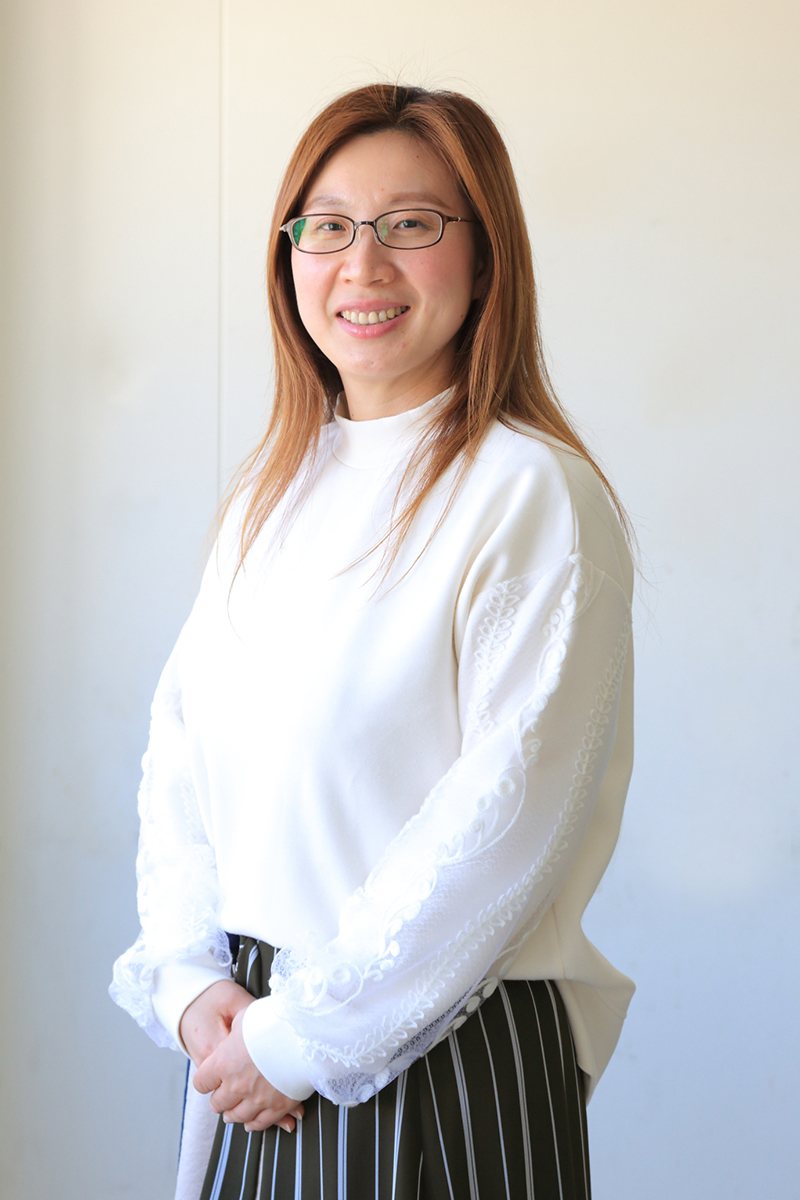
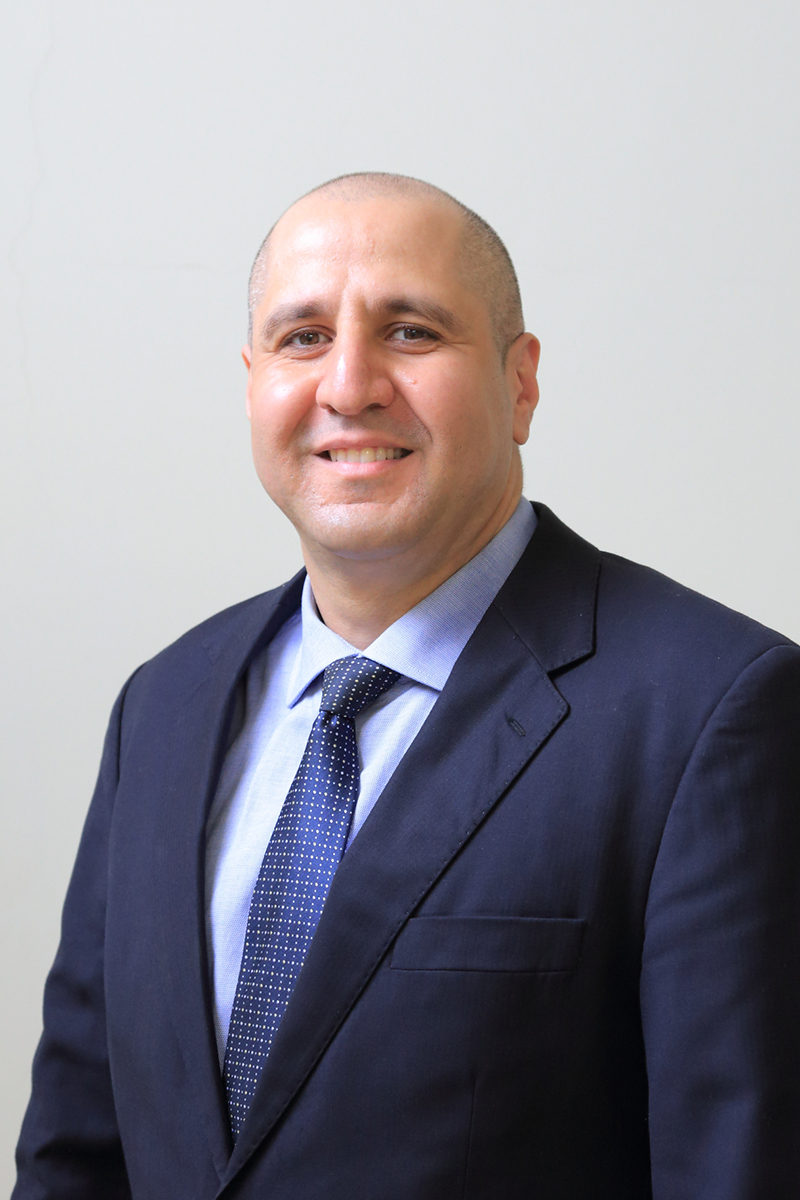
We have well-stocked laboratories for infrastructure
This department has 6 laboratories for infrastructure; Hydrospheric Environment, Environmental Planning, International Water Environment, Geo-environment and Civil Engineering Structures. You can study about ground, civil engineering and water environment which are required to create a safe and secure infrastructure.
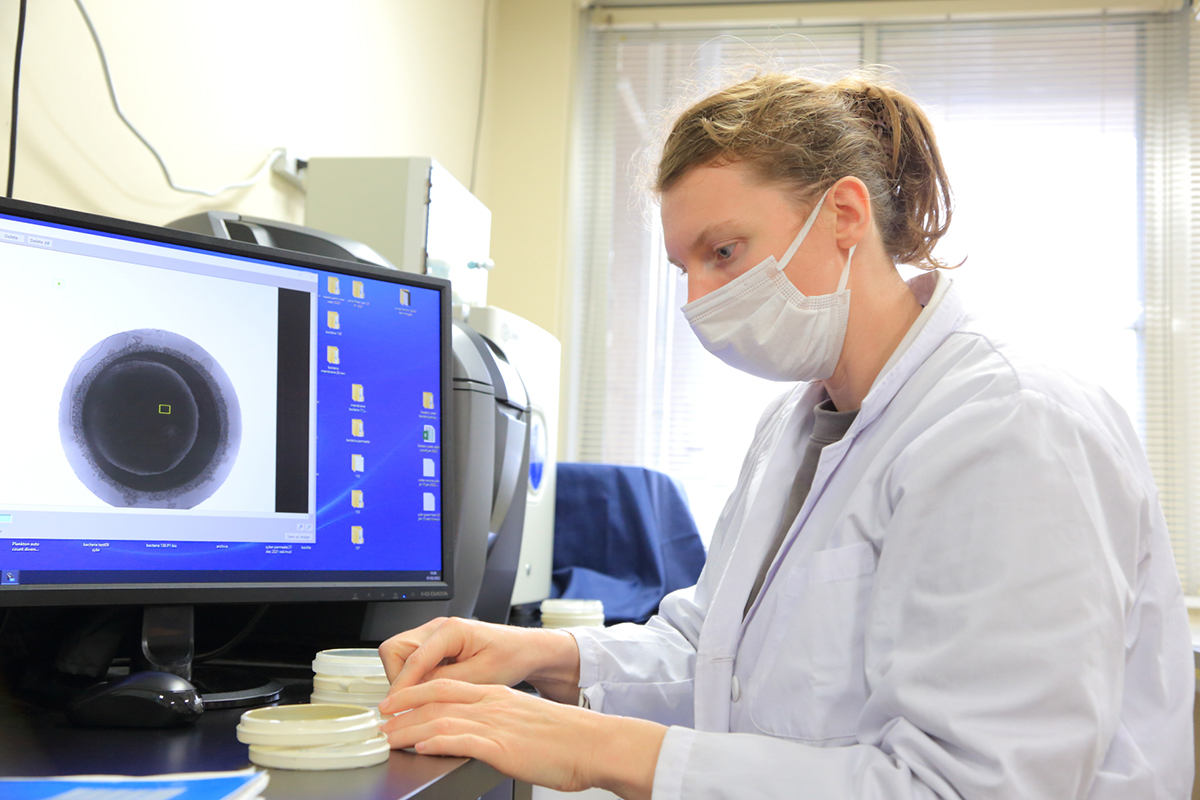
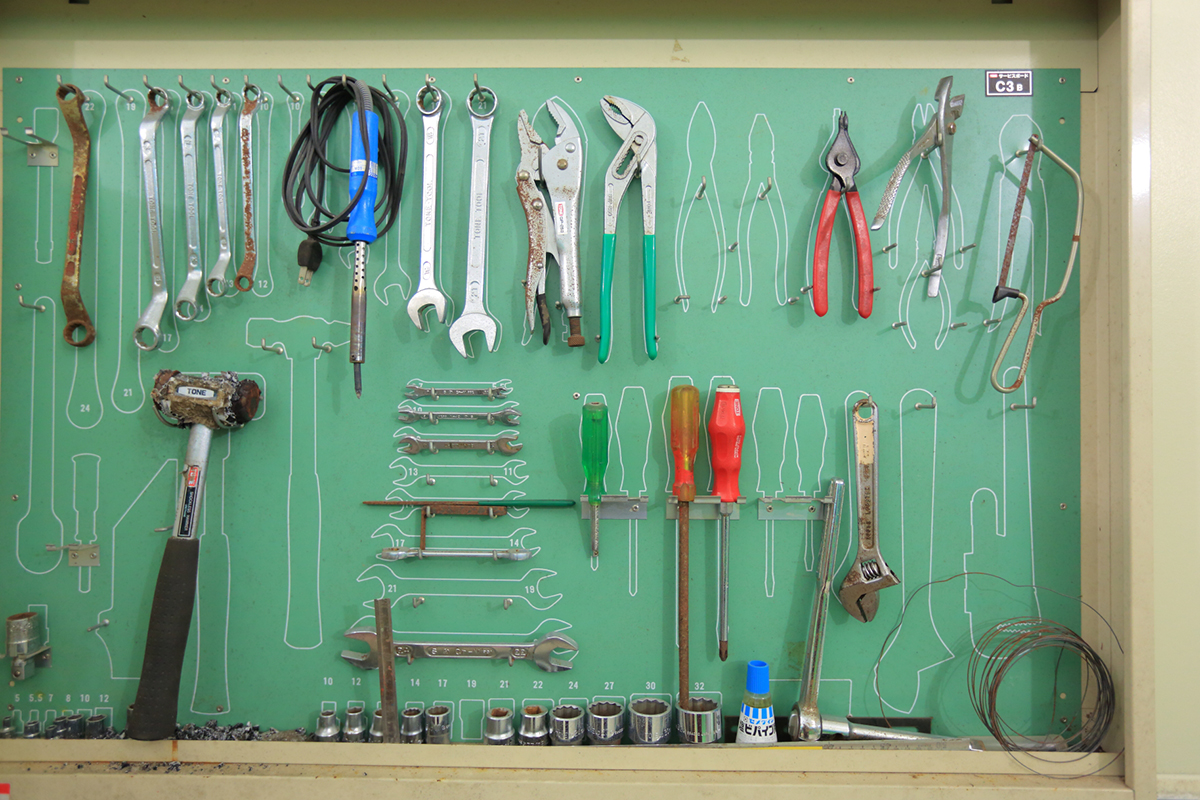
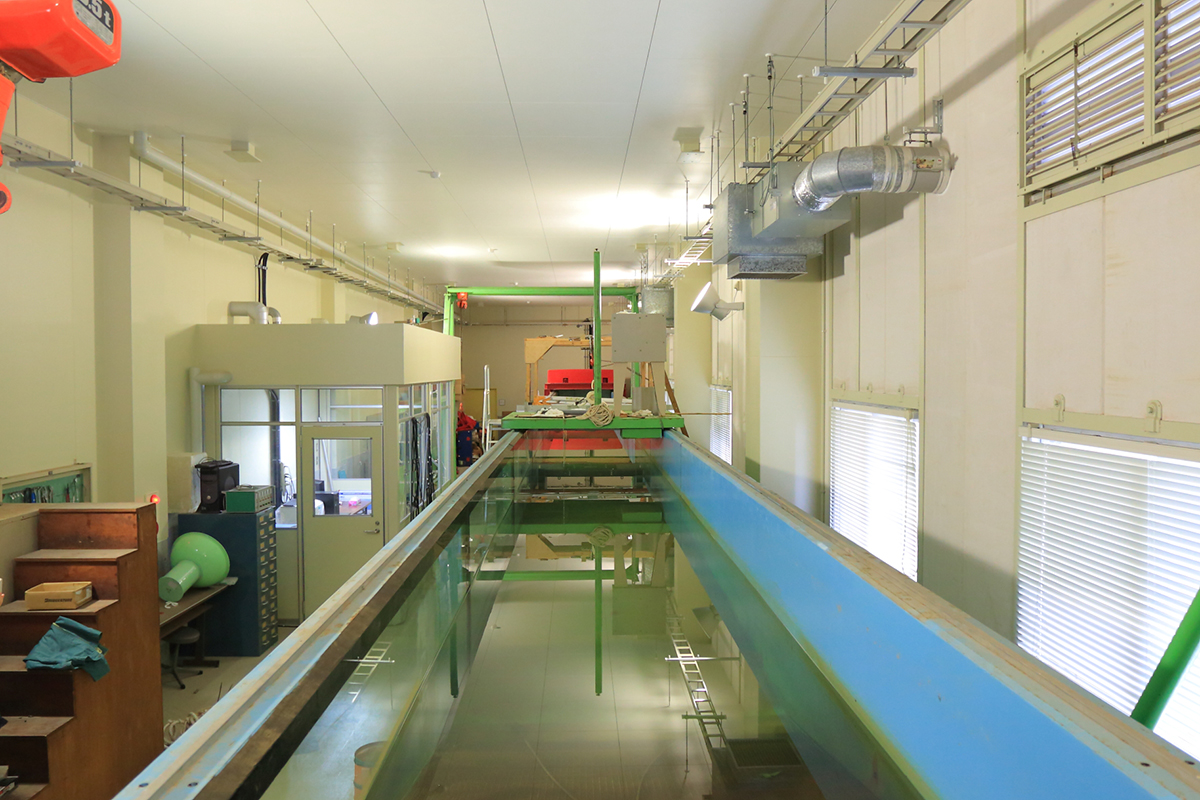
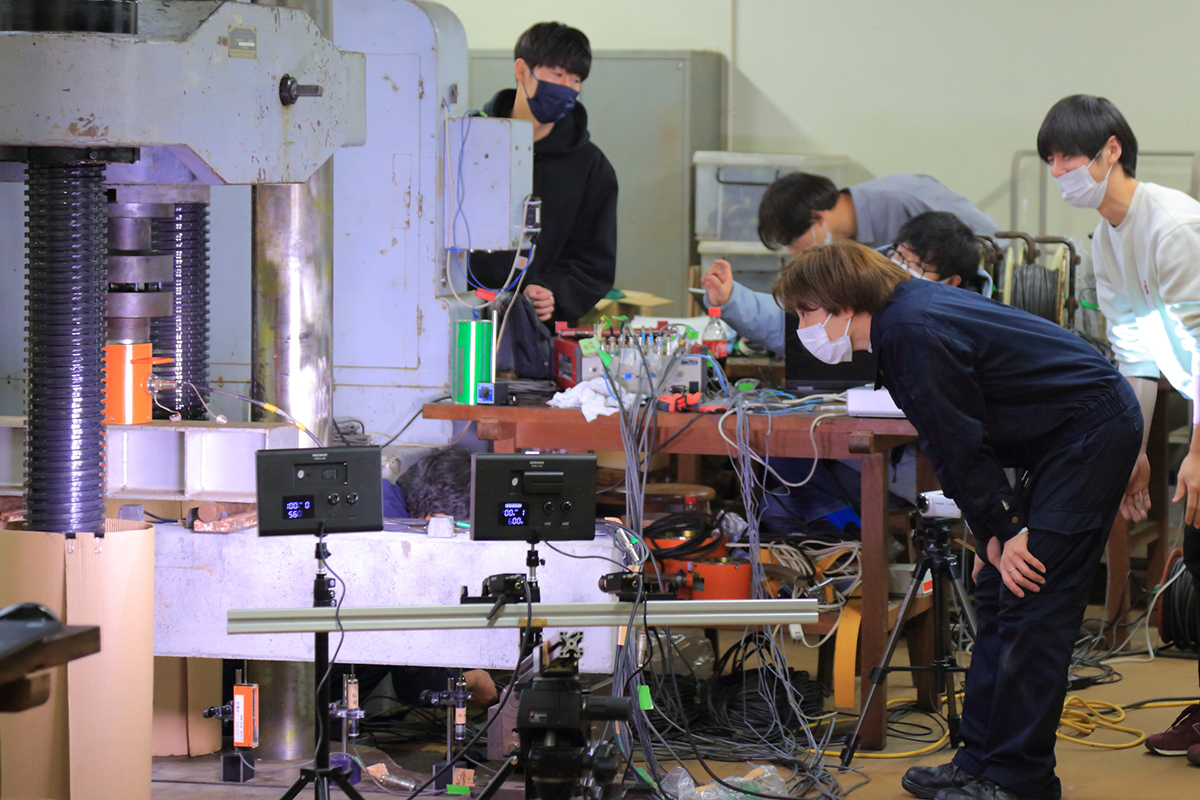
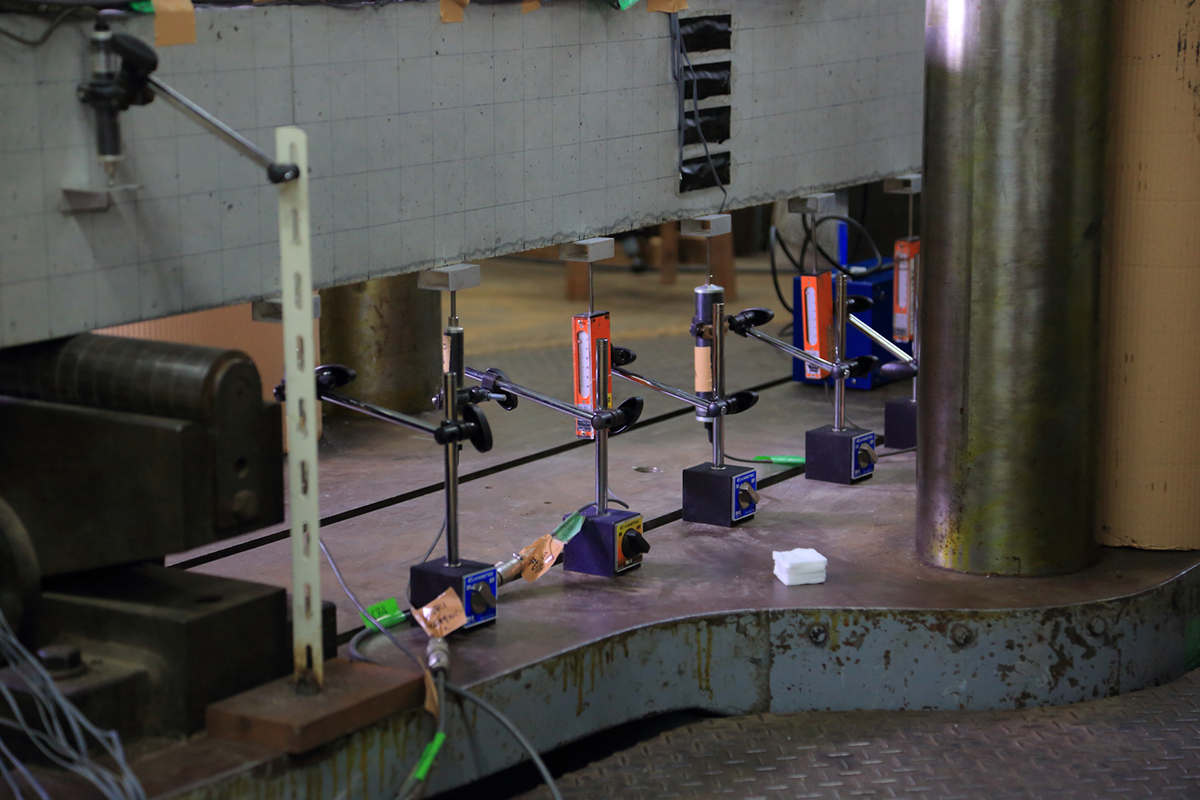
Let’s enjoy Japanese food!
Nagasaki University has university co-op and a cafeteria. Talking about the university co-op, at the store on campus, you can get groceries including freshly baked bread and boxed lunches, stationary and daily necessities. In addition to those, you can also get OA equipment and Nagasaki University original goods. Talking about the cafeteria, in addition to a daily special with rice as the main dish, there are also Donburi, noodles and single dishes. Its cafeteria is quite large and cleanliness
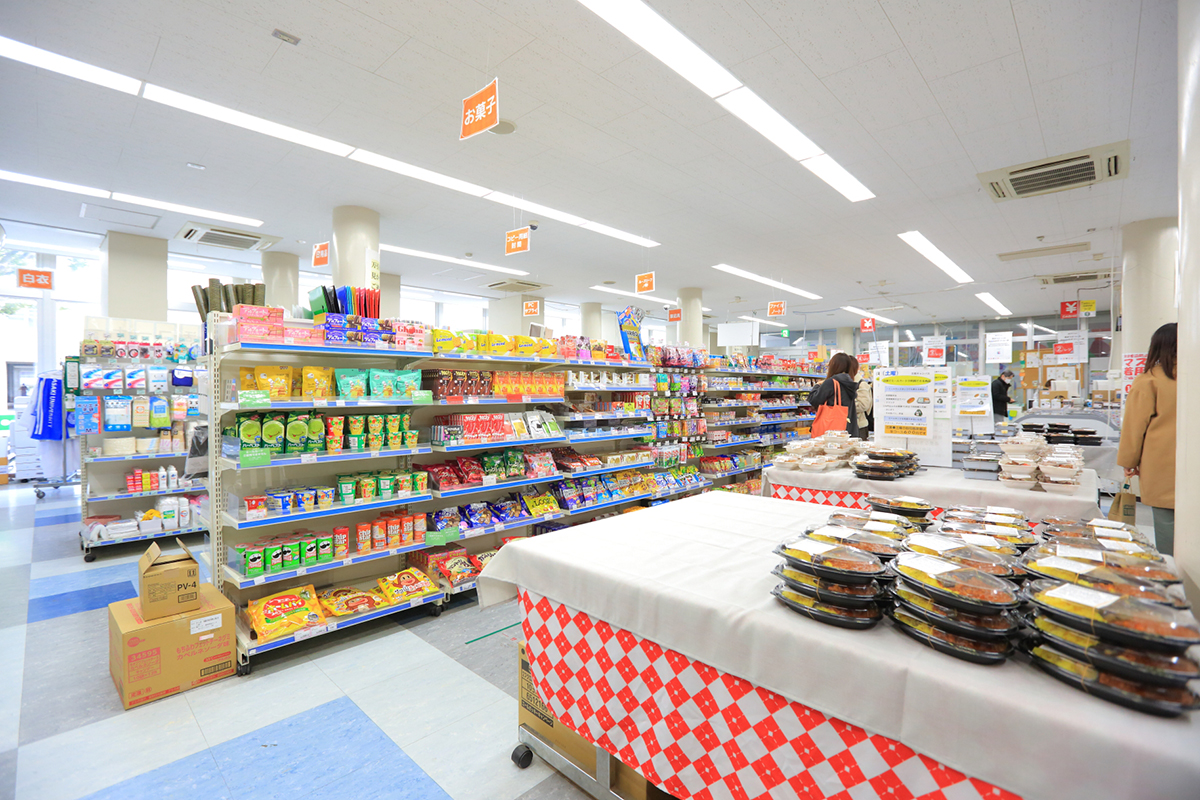
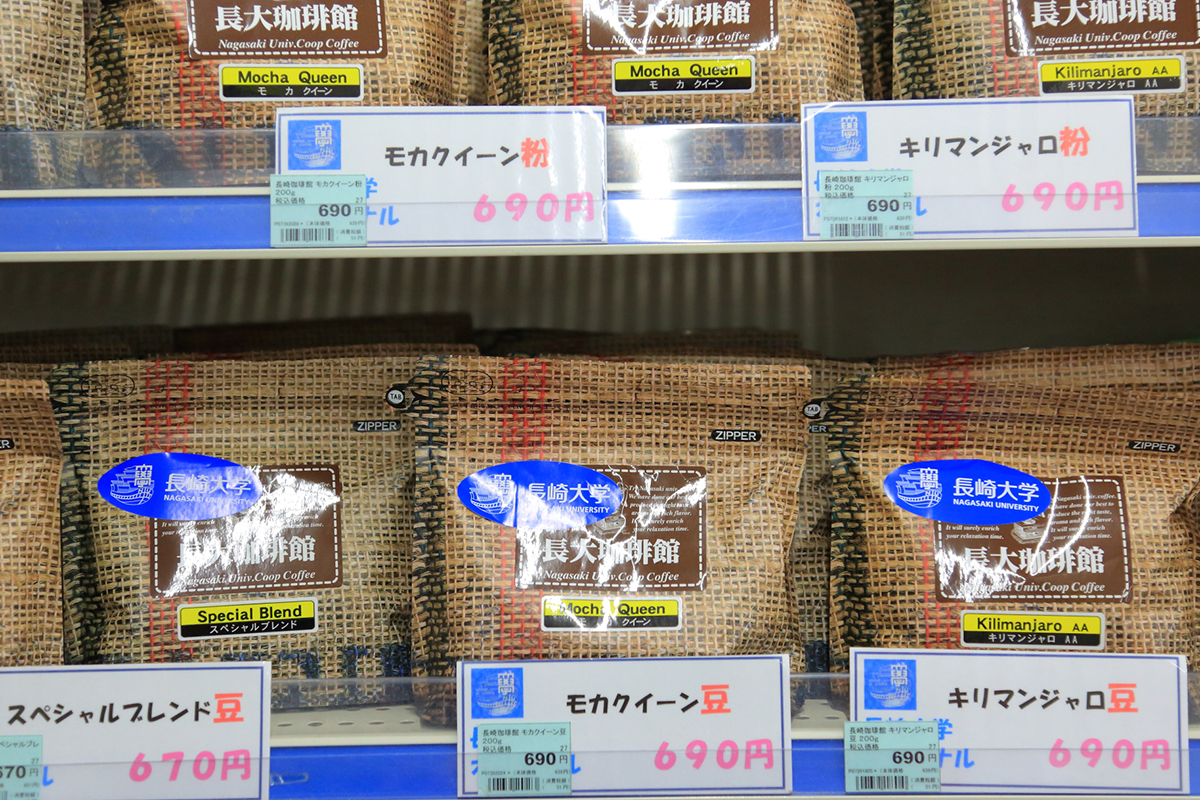
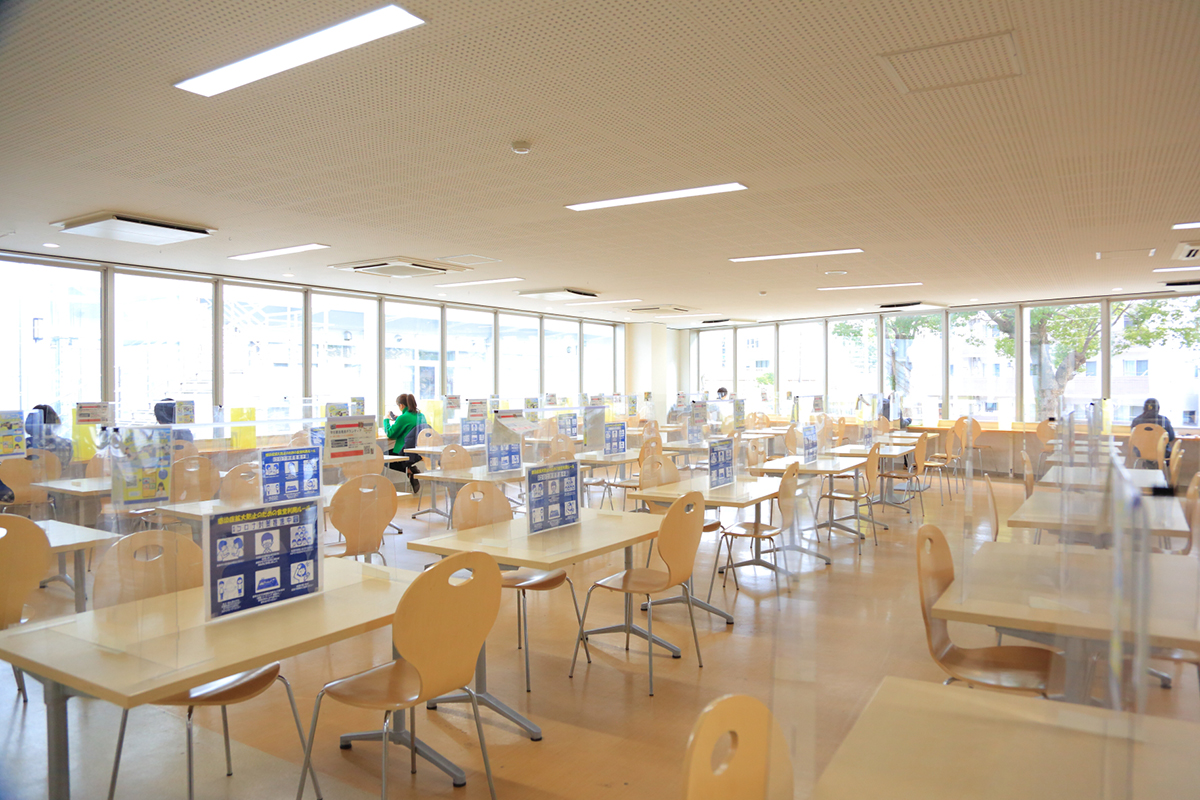
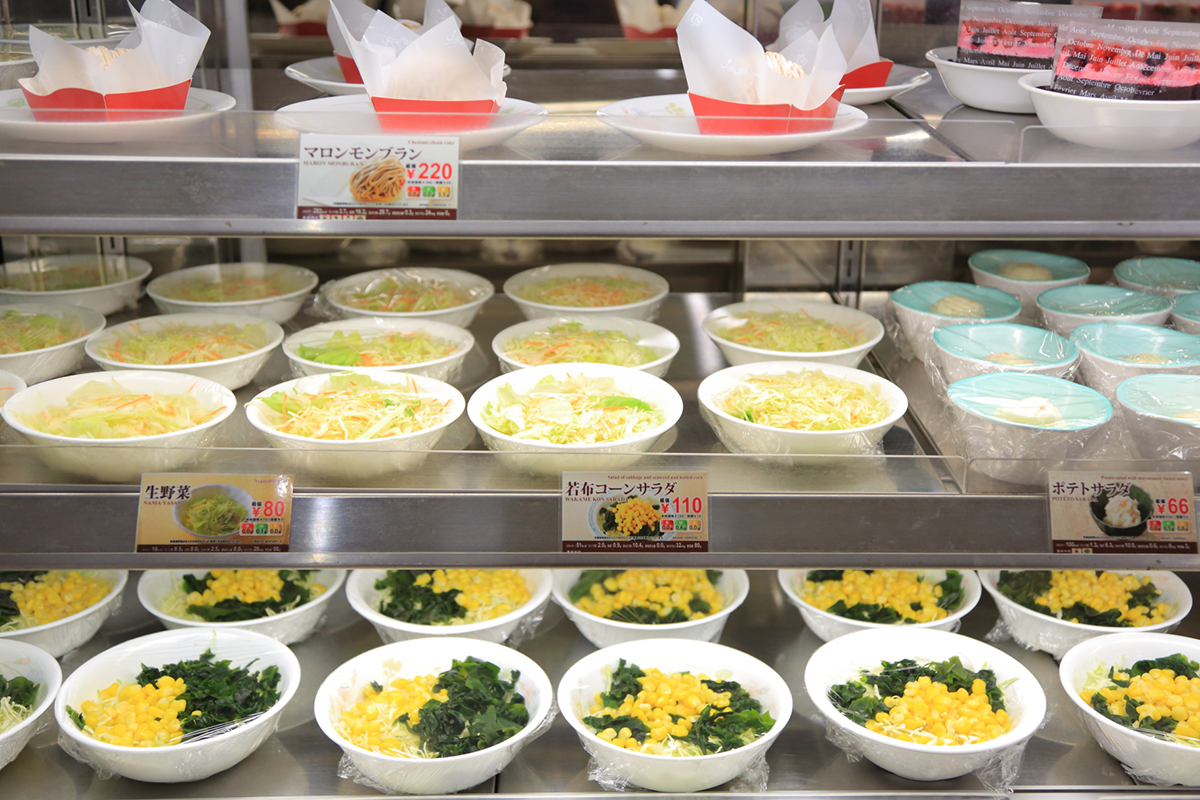

”Nagasaki University Library”, which you can use the study space.
The library, which stands in front of the Department of Engineering, boasts a collection of some 592,400 books alone. The library has an ICT support counter for computer-related questions and consultations, a learning commons where students can study while conversing, and a library lounge that can be used for group study and refreshments. The library lounge is highly convenient and well received by students.
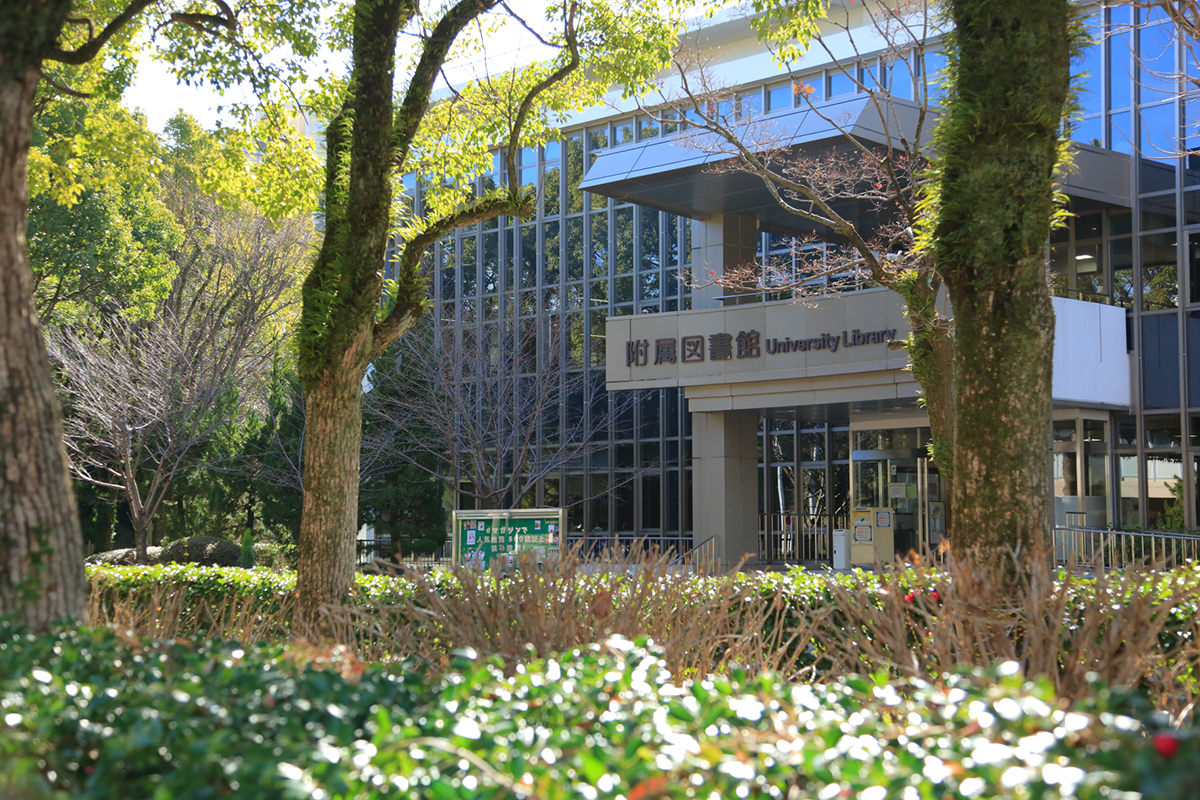
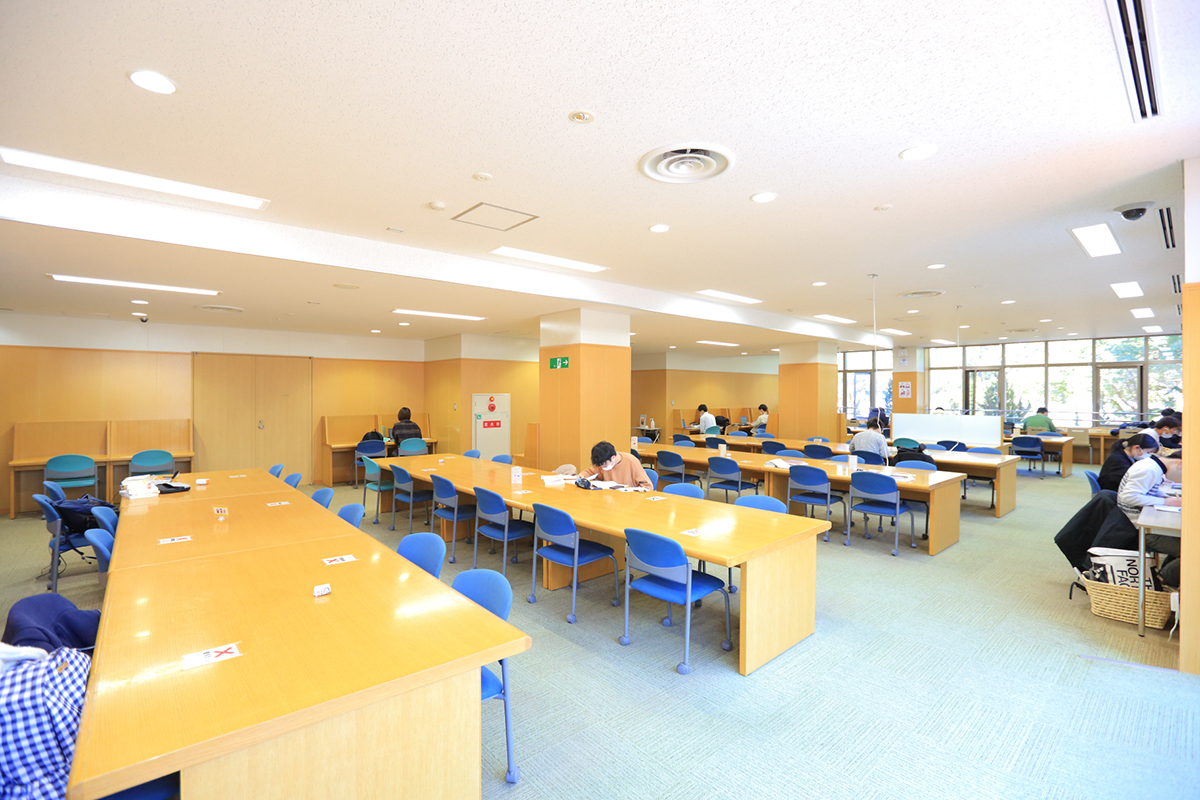
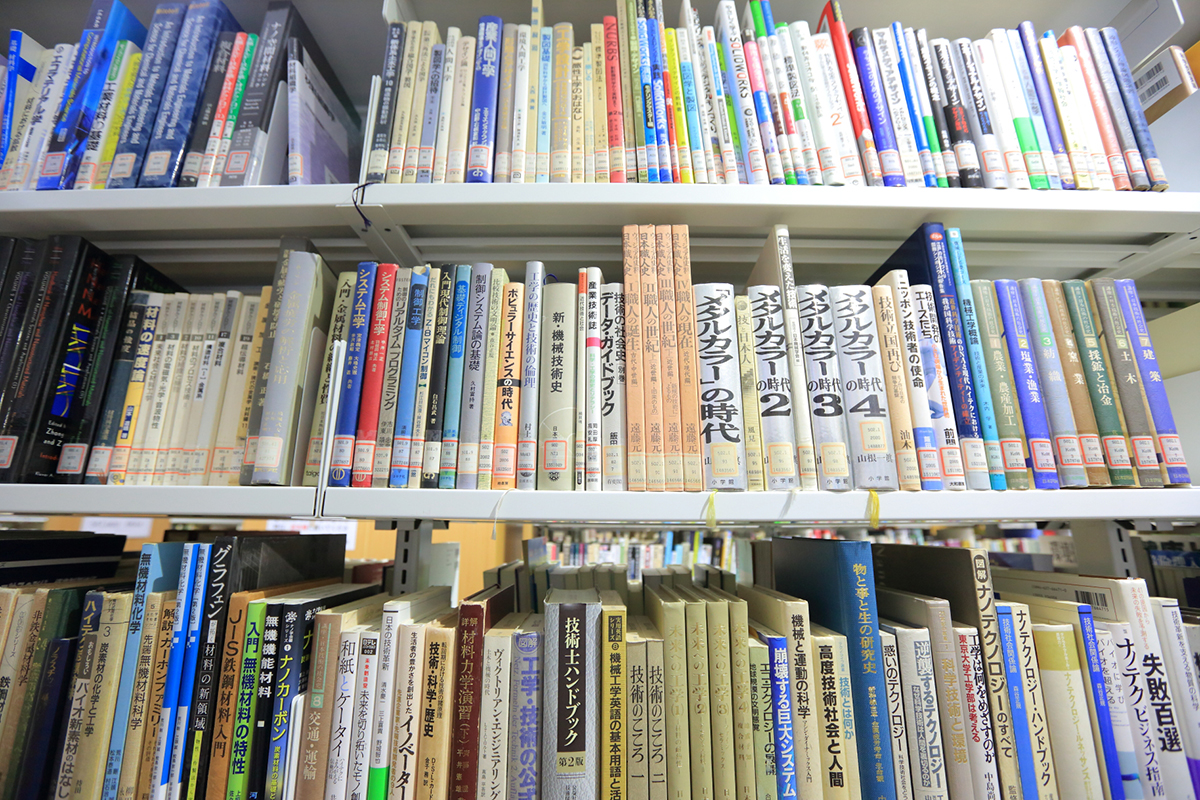
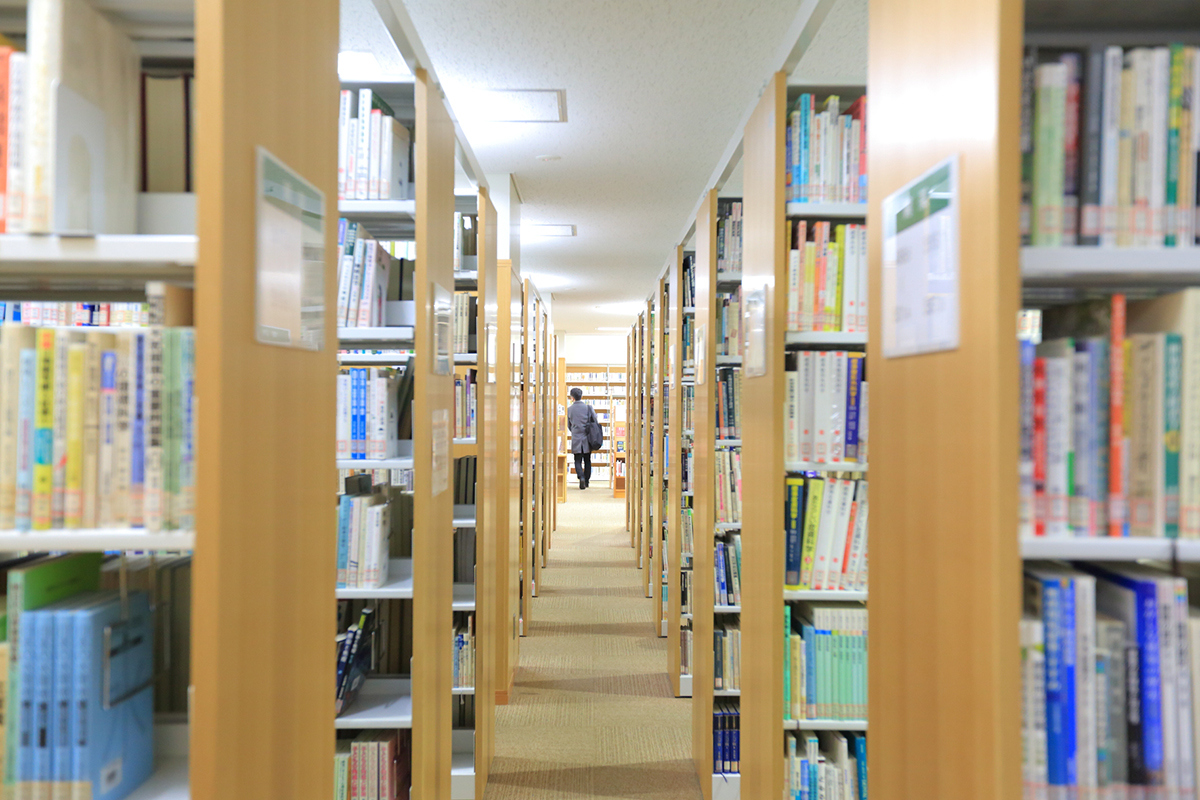
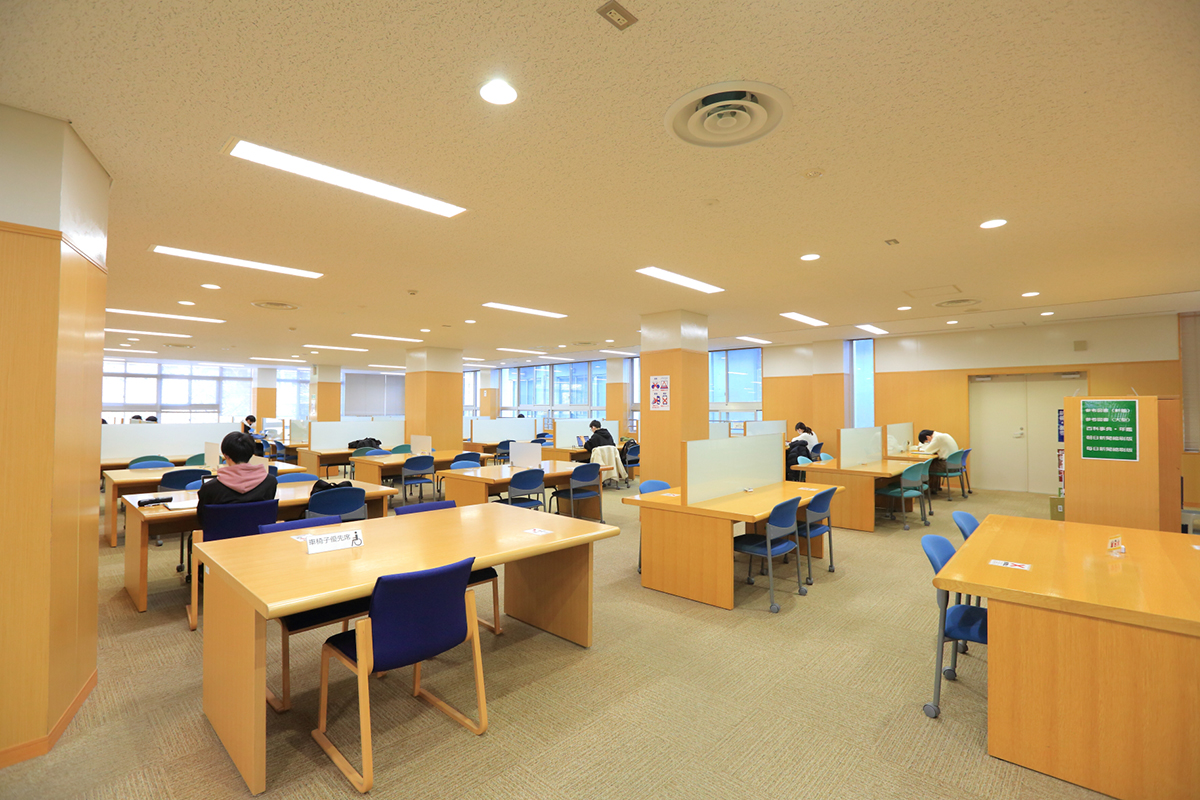
Campus
Great shopping! Sumiyoshi・Nakazono Shopping Streets
The area around the campus has Sumiyoshi Shopping Street and Nakazono Shopping Street, which are locally loved. Fresh food, clothing stores, bookstores, drugstores, beauty salons, and other necessities are available and very convenient. There is also a wide variety of restaurants and eateries suitable for both day and evening meals.
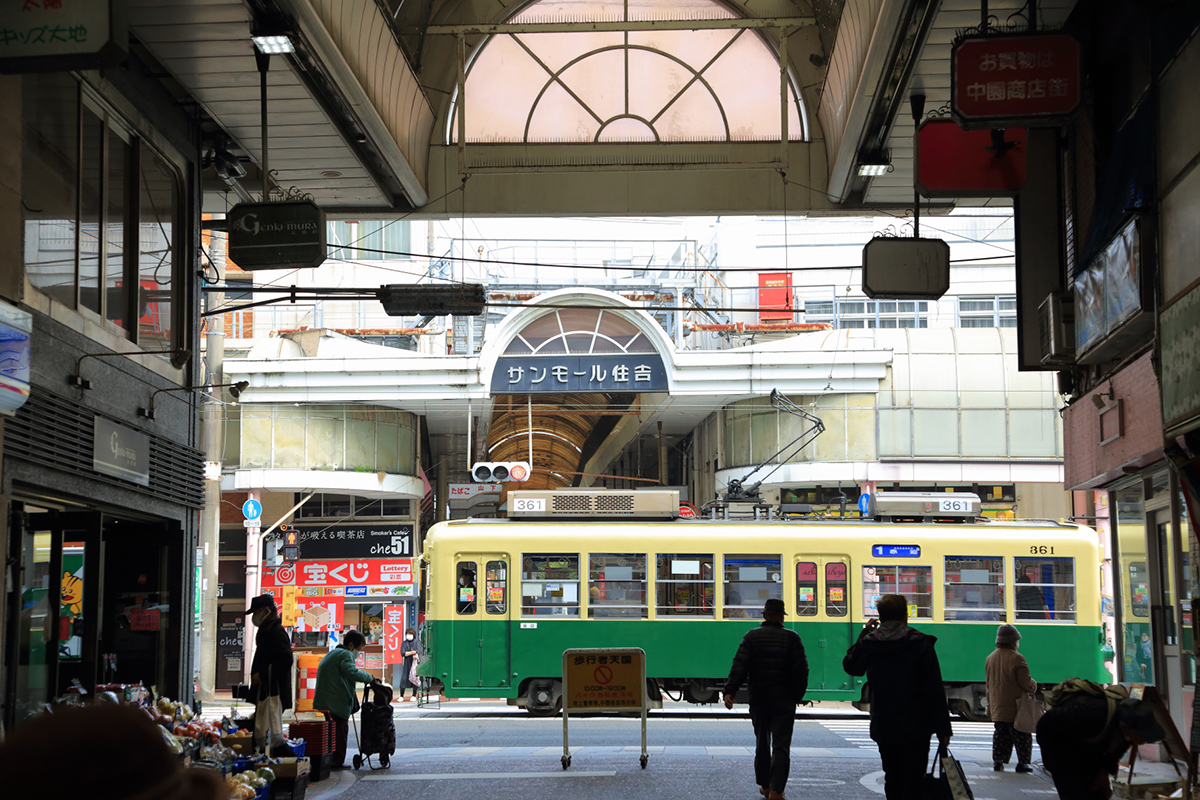
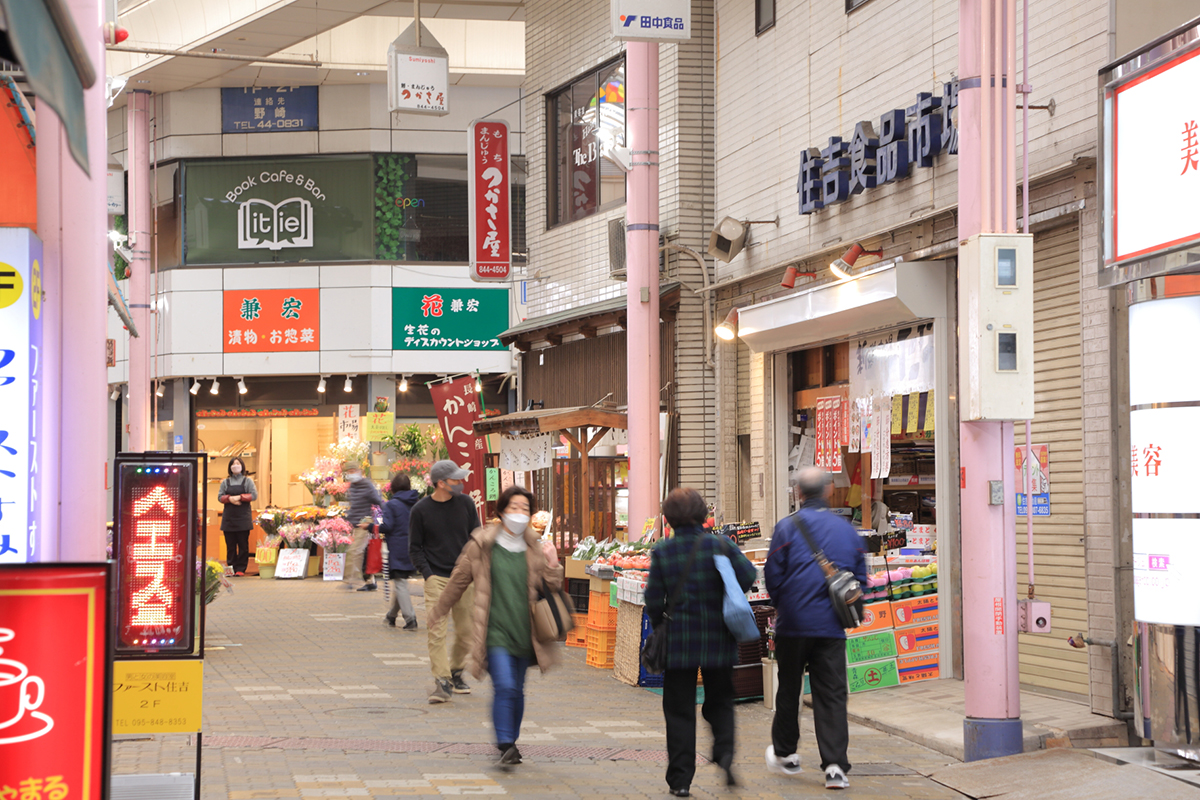
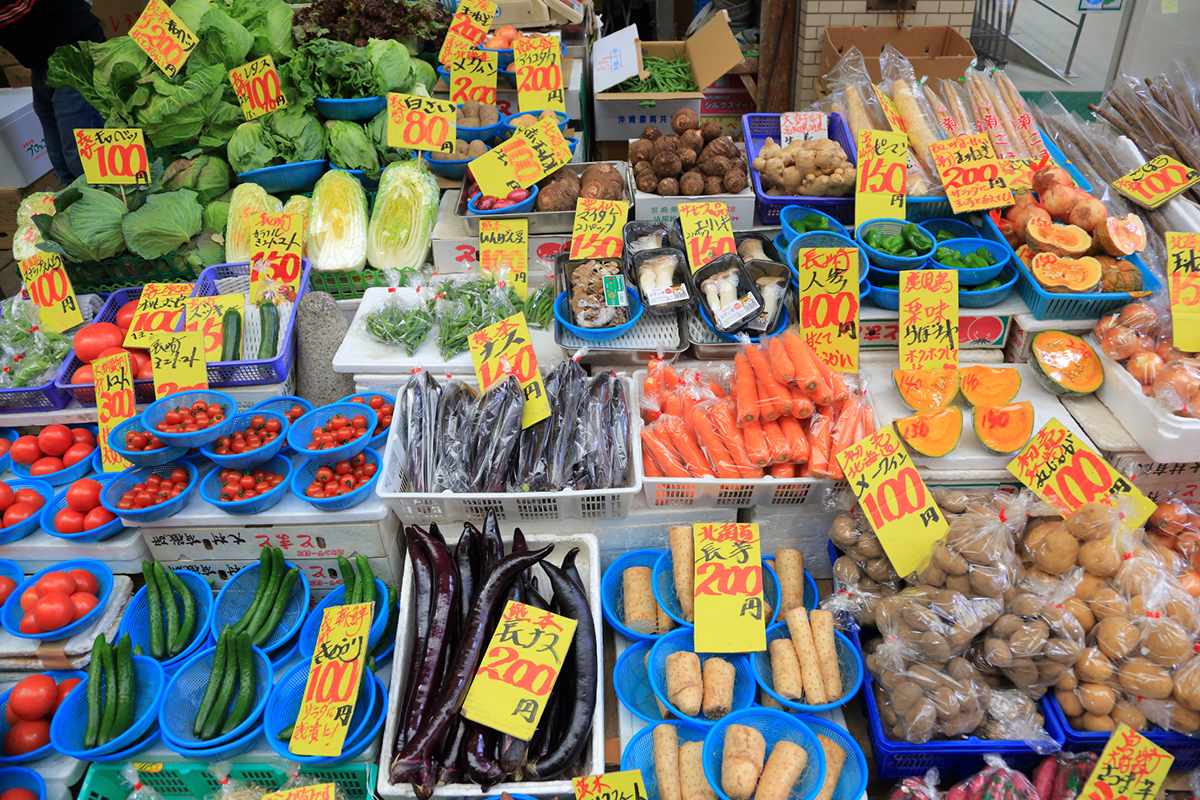
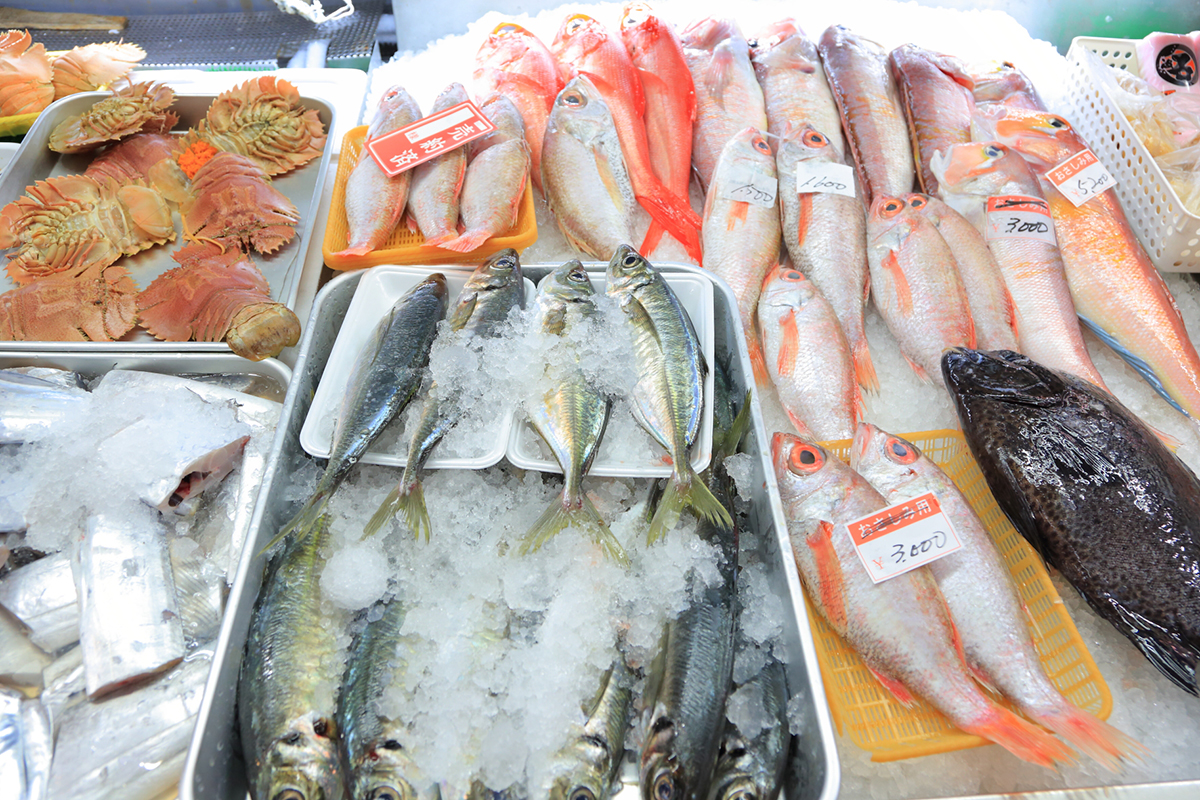
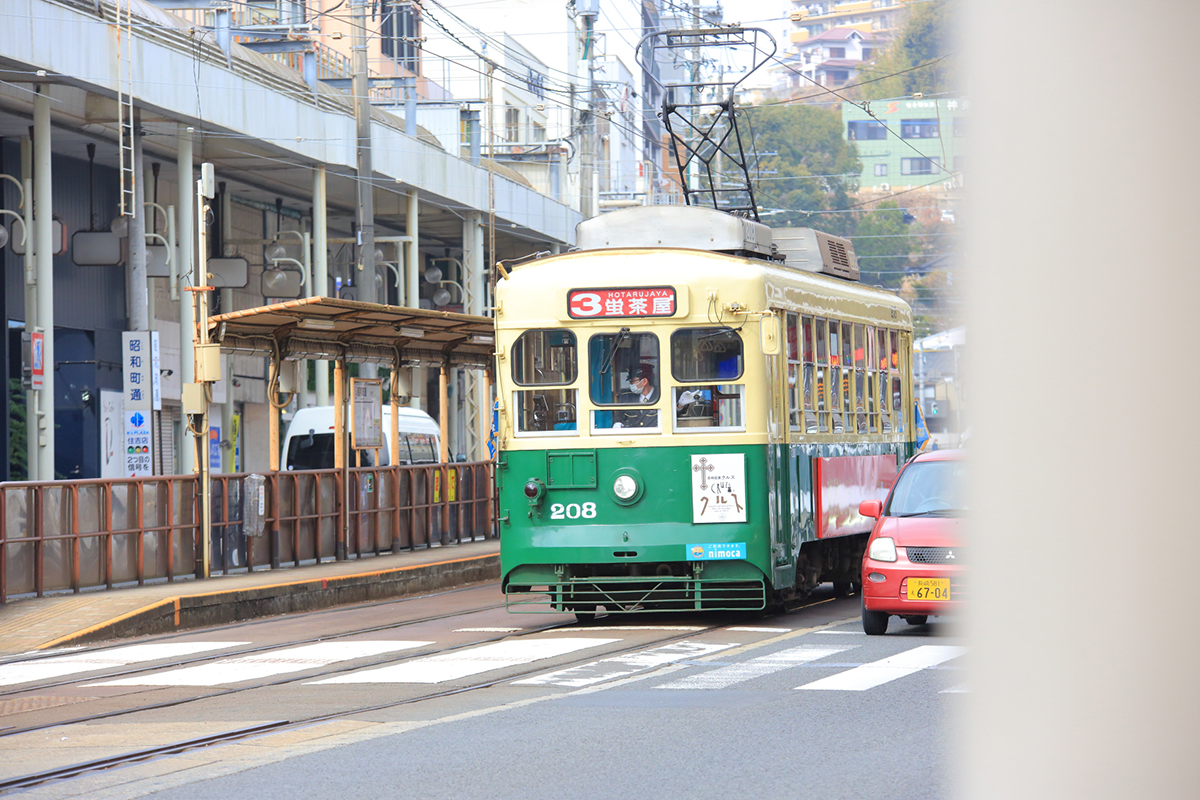
Shandong University (China)
Professors will be there to assist you with your research.
With the experience of accepting international students for more than 50 years, the university has the largest number of international students in Shandong Province. Many professors have over 20 years of experience!
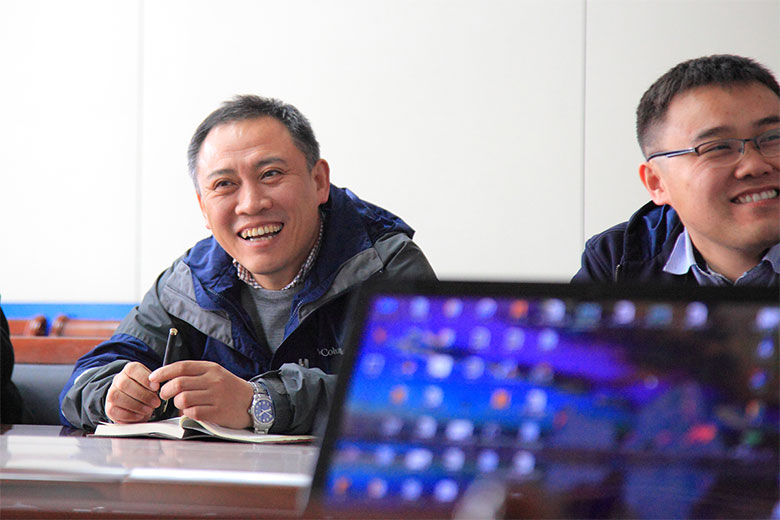 The deputy director, Prof. WANG SHUGUANG, with a nice smile is a vice chairman of this program.
The deputy director, Prof. WANG SHUGUANG, with a nice smile is a vice chairman of this program.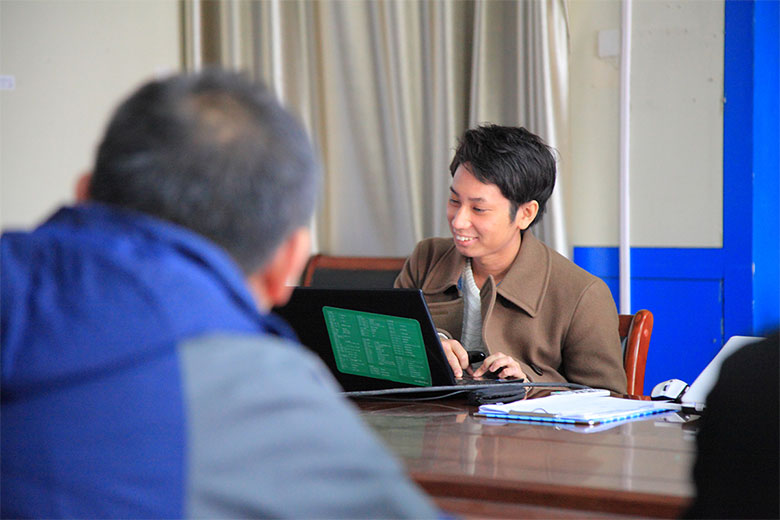
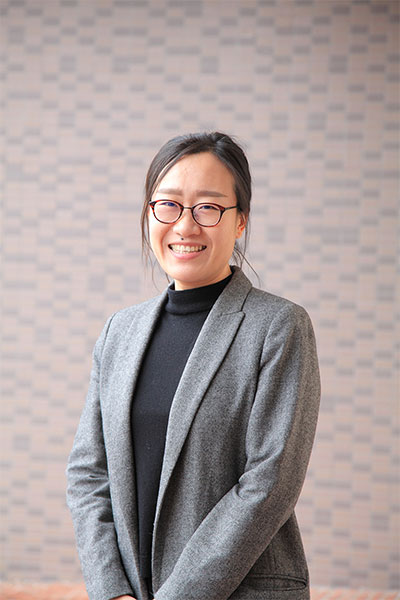 I’m Zhu Lingxue, acting as a bridge between Nagasaki University and Shandong University.
I’m Zhu Lingxue, acting as a bridge between Nagasaki University and Shandong University.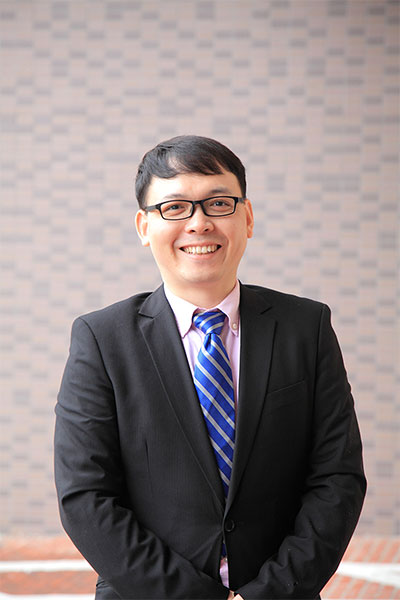
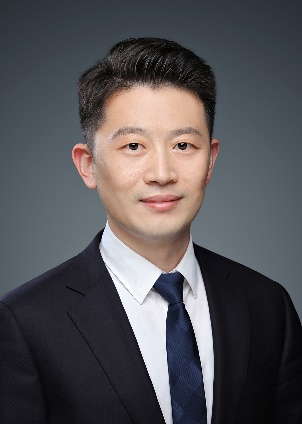 I’m Li Yonh, an associate professor at School of Engineering of Shandong University. Nice to meet you!
I’m Li Yonh, an associate professor at School of Engineering of Shandong University. Nice to meet you!Senior students will also be there to support your research.
Students are expected to identify a task and engage in research on their own at Shandong University. Collaboration with your classmates and senior students will help make your research more meaningful and productive. Students, of course, communicate in English.
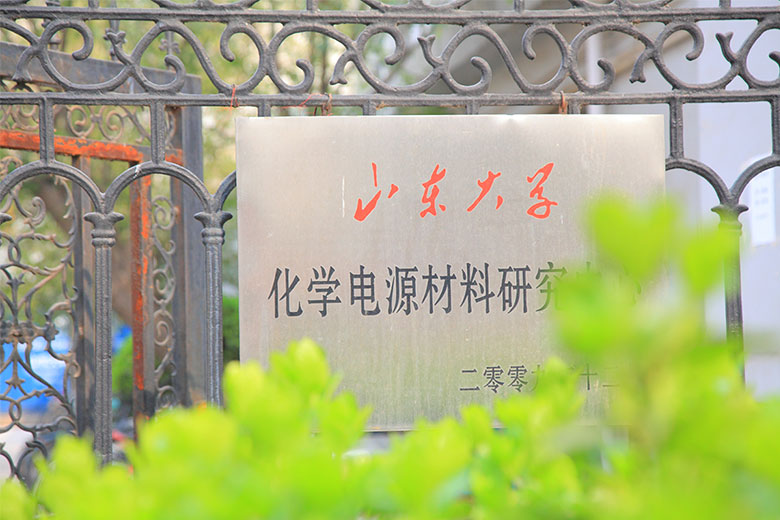
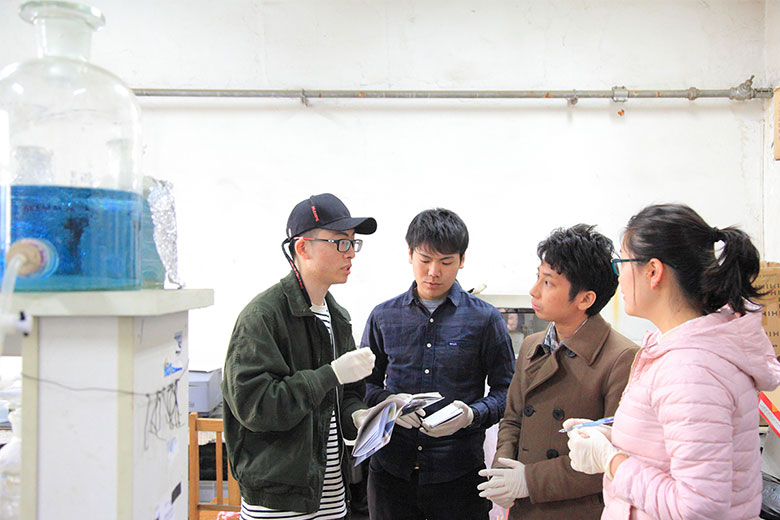 Once all set up, we can start research!
Once all set up, we can start research!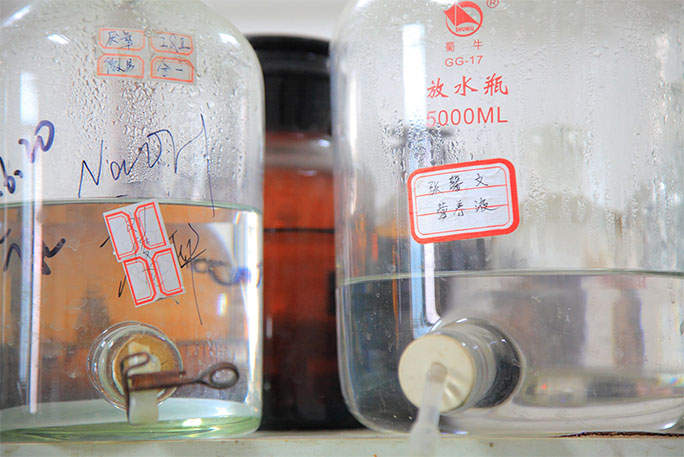 Write your name on your research material.
Write your name on your research material.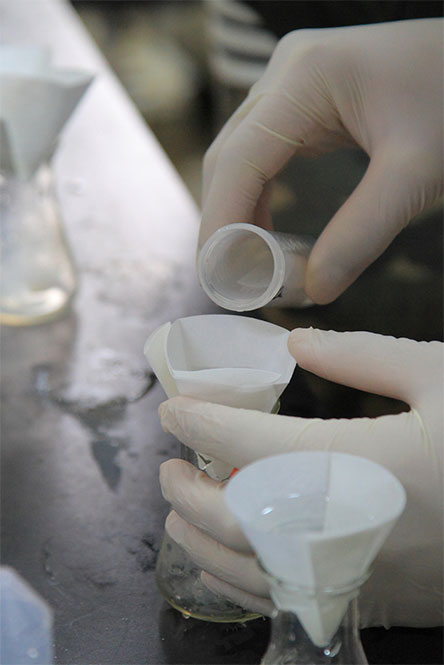 Let’s pour it in gently and slowly.
Let’s pour it in gently and slowly.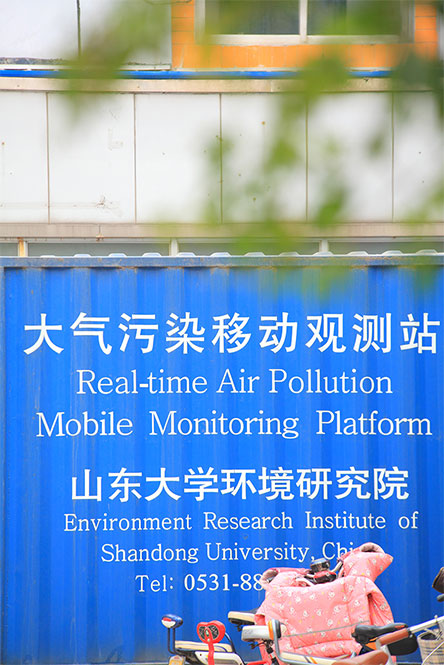 Air pollution is, indeed, the top priority to be resolved in China.
Air pollution is, indeed, the top priority to be resolved in China.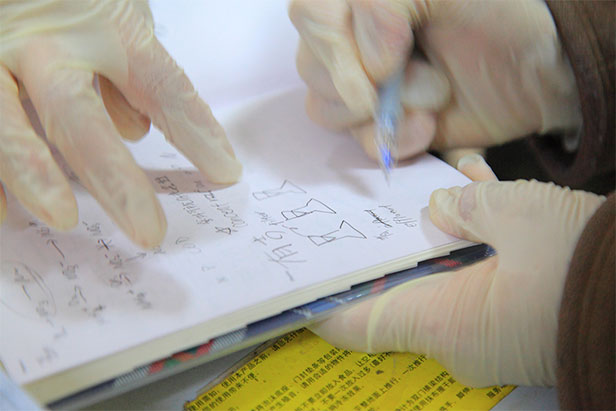 You need to take a good note.
You need to take a good note.Every dish at the cafeteria is tasty!
The central campus has a cafeteria building with four floors above the ground and one floor under the ground. Each floor has cafeteria with various items from stir-fried dishes and steamed dishes to noodles! You can even find Halal dishes. One dish costs about 10 yuan (about 180 yen).
 Enjoy juicy boiled dumplings!
Enjoy juicy boiled dumplings!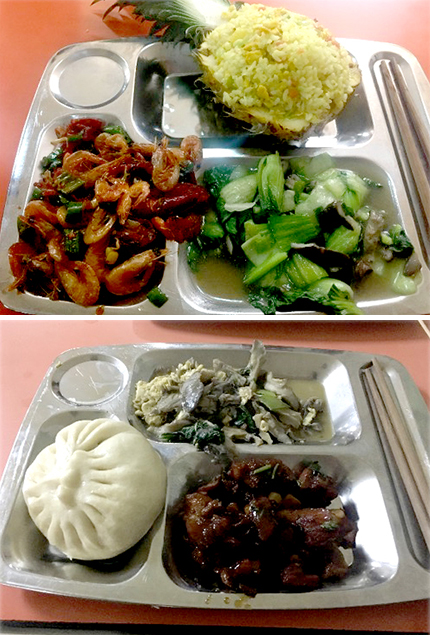
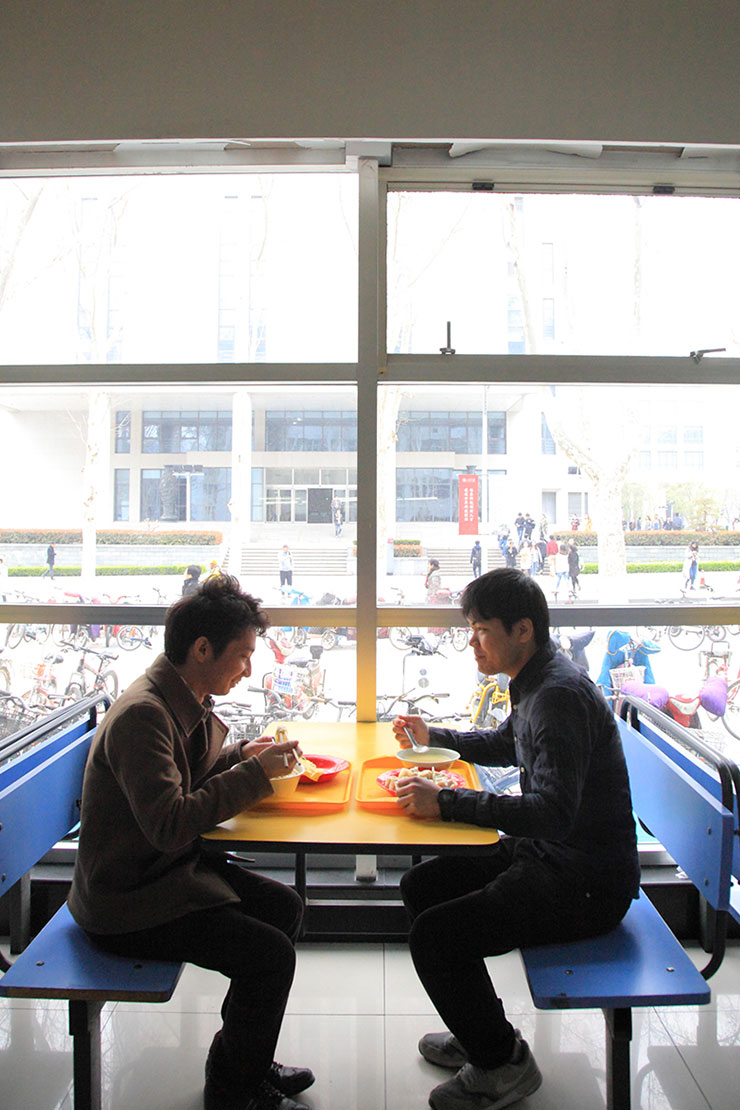
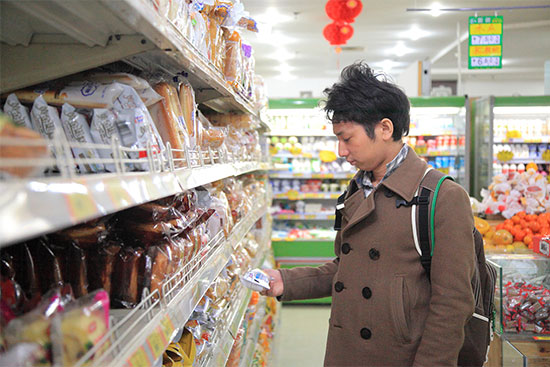 There’s a food market on the basement floor, where you can buy your breakfast.
There’s a food market on the basement floor, where you can buy your breakfast.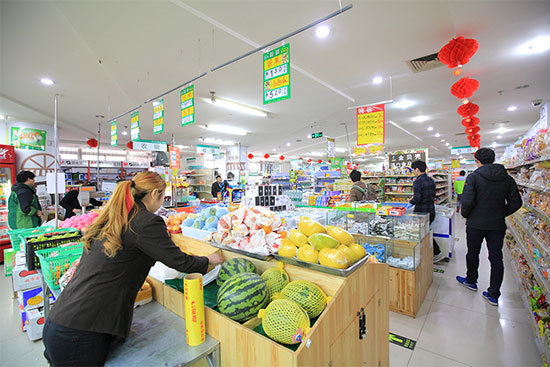 There’s a food market on the basement floor, where you can buy your breakfast.
There’s a food market on the basement floor, where you can buy your breakfast. There are more than 10 varieties of noodles. This one has a mild flavor with chicken.
There are more than 10 varieties of noodles. This one has a mild flavor with chicken.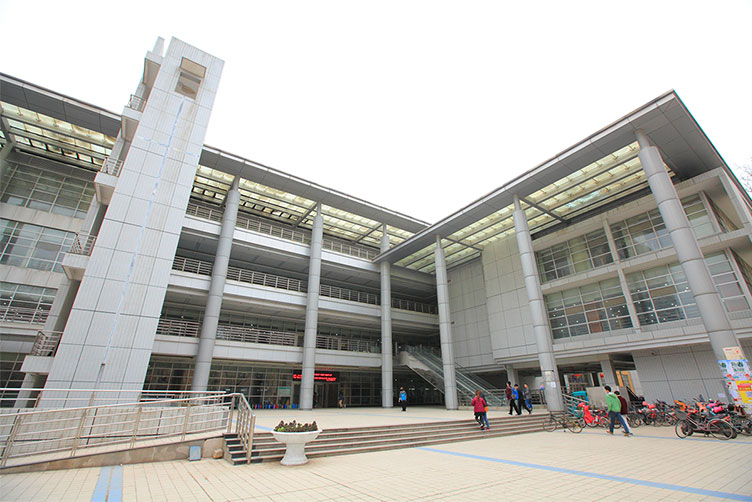 The whole building is occupied by cafeteria.
The whole building is occupied by cafeteria.Let’s take a look at the Shandong University Museum!
The museum in the central campus exhibits precious clay vessels and the like discovered in Shandong Province, showing its deep and long history.
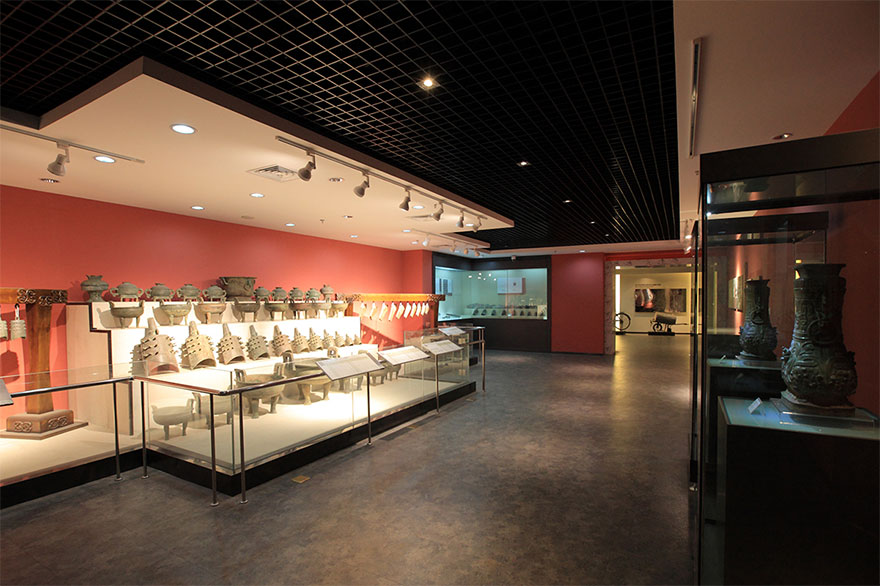
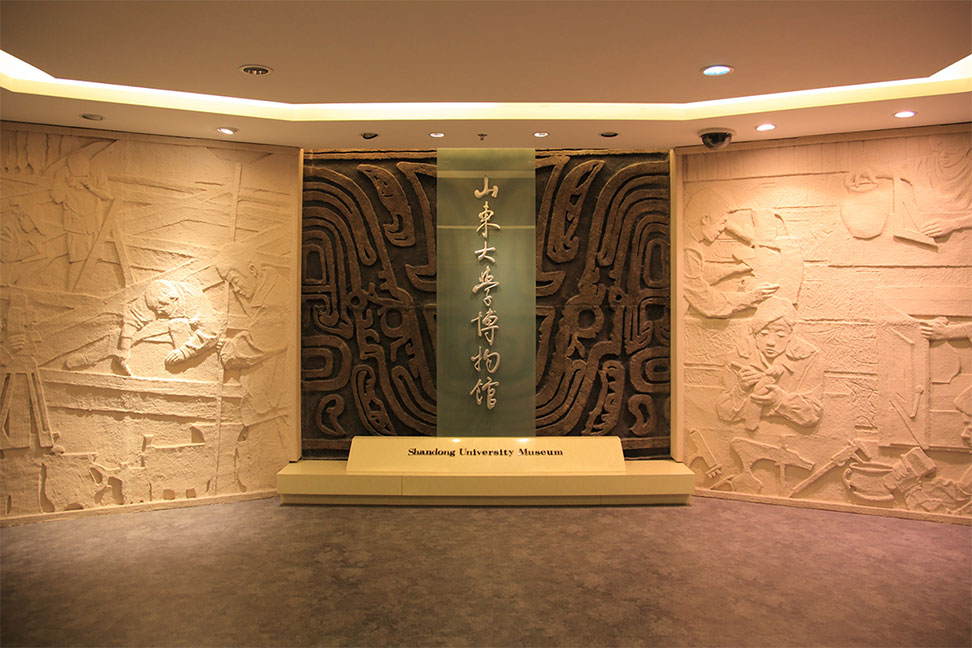
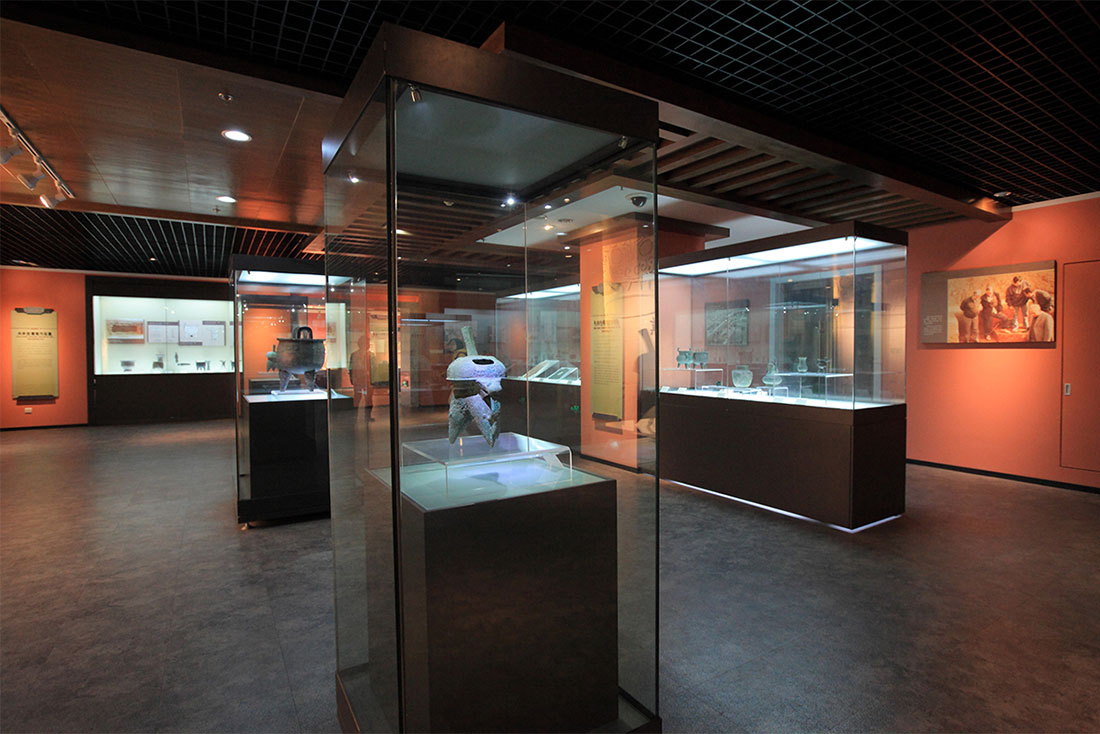 You can have a look at the unearthed objects with which professors at Shandong University are involved.
You can have a look at the unearthed objects with which professors at Shandong University are involved.You can cook for yourself, making yourself at home!
The campus has three large dorm buildings. Each dorm consists mainly of private rooms as well as shared rooms for two or four persons. There are so you can easily start staying in the dorm. You will see messages from other international students on the wall in the public space on the first floor!
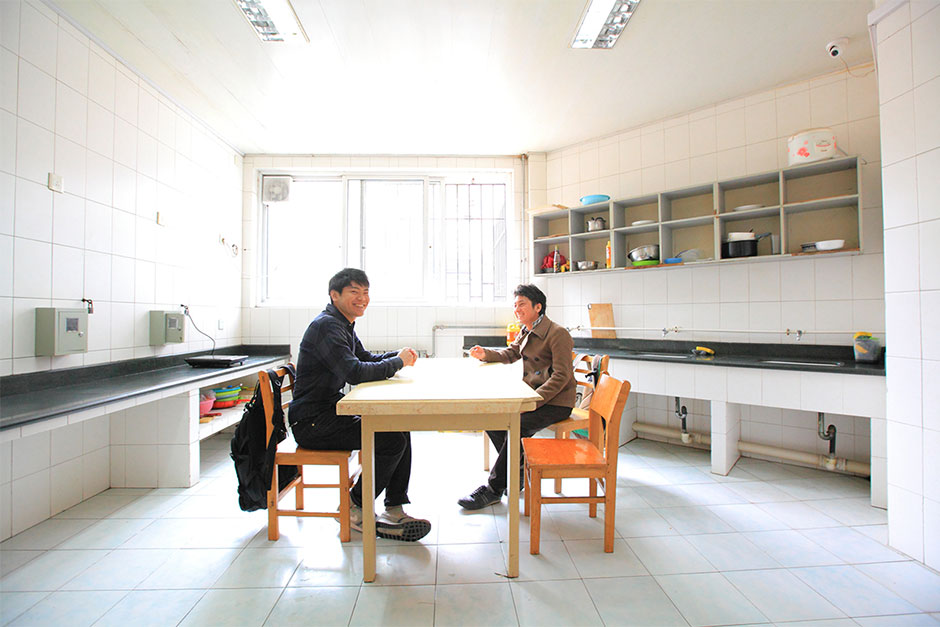 The communal kitchen can also be used as a place for communication with students from other countries.
The communal kitchen can also be used as a place for communication with students from other countries.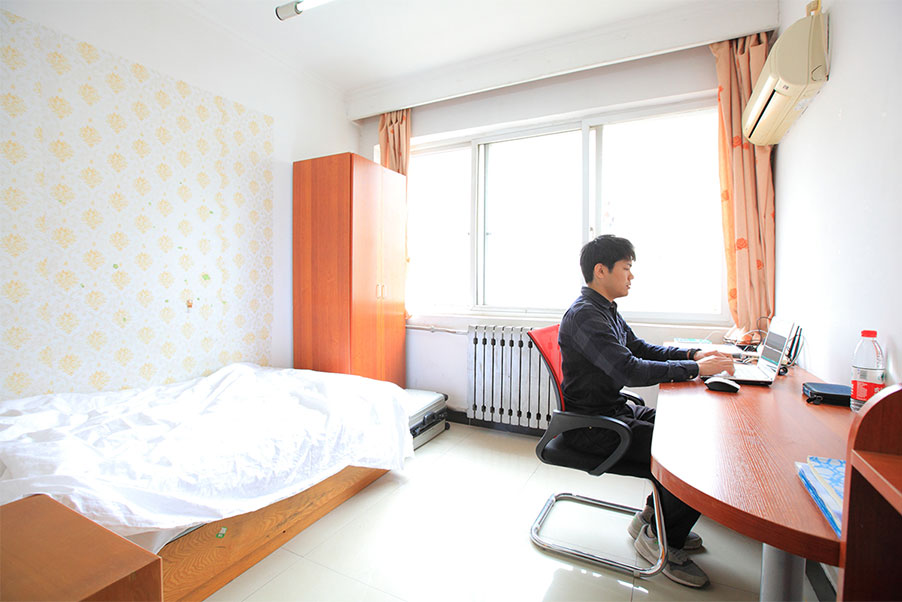 Each private room is equipped with a toilet and a shower!
Each private room is equipped with a toilet and a shower!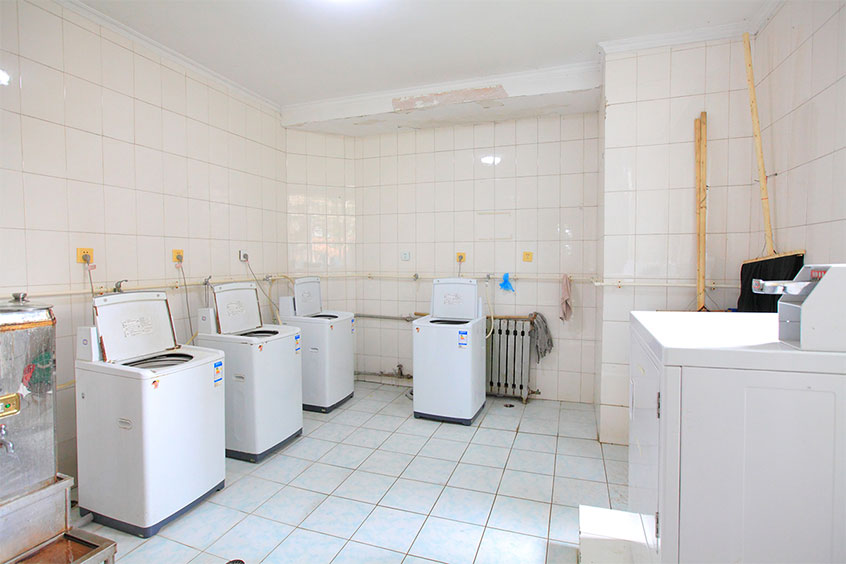 Washing machines are available, although the number is limited.
Washing machines are available, although the number is limited.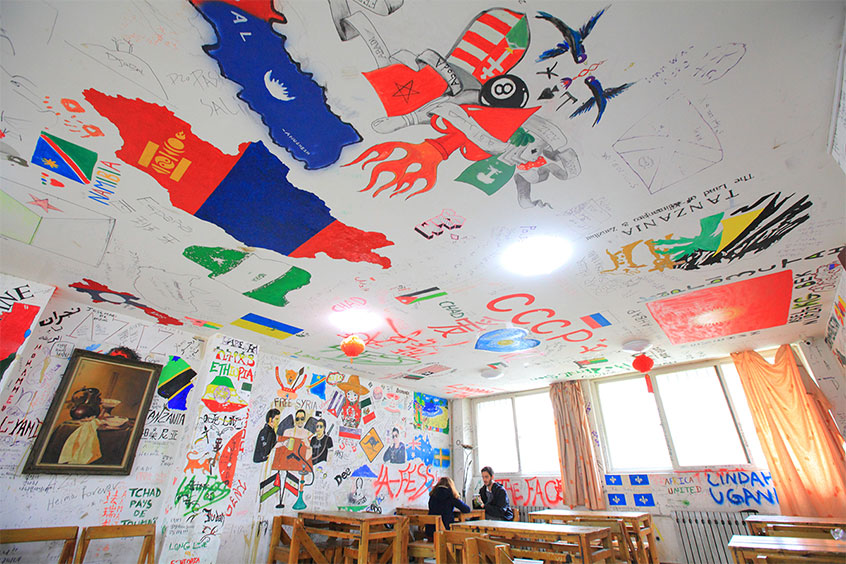 On the wall you will find a lot of messages written by international students from around the world!
On the wall you will find a lot of messages written by international students from around the world!Campus
In the exciting downtown area of Jinan, from botanical garden to park!
The campus of Shandong University is located in the heart of Jinan, a big city with large parks and shopping malls. It has many good places to eat, from cafeteria to restaurant!
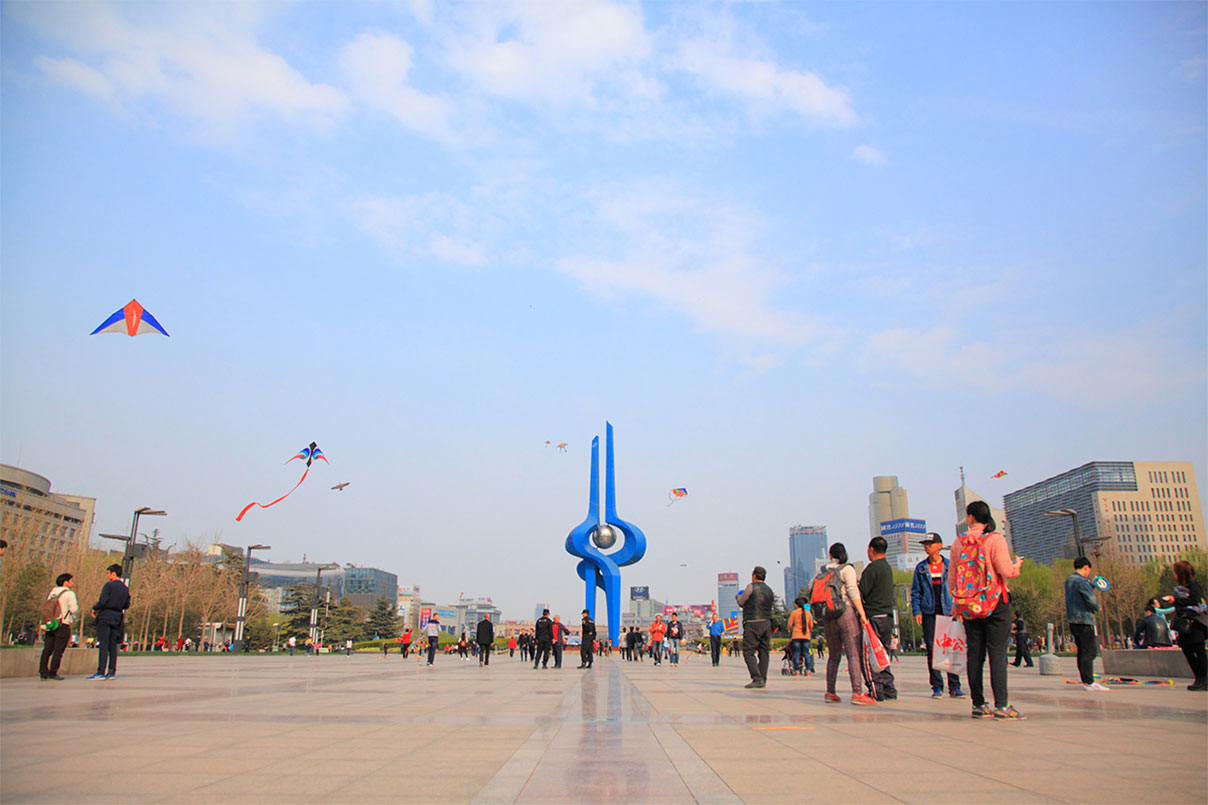 In Quancheng Square, where a tower with the mark of Jinan City stands as a symbol, local people enjoy flying kites on weekends.
In Quancheng Square, where a tower with the mark of Jinan City stands as a symbol, local people enjoy flying kites on weekends.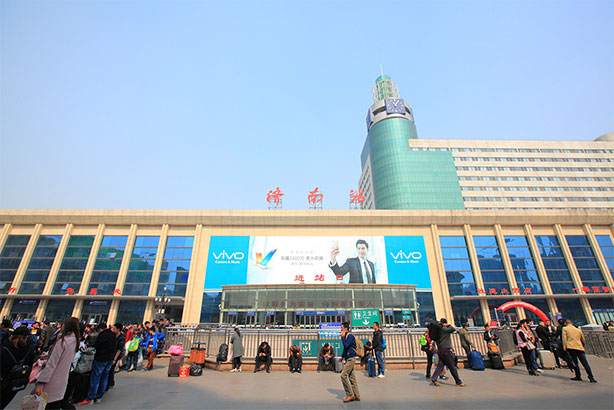 This is the Railway Station Square in Jinan.
This is the Railway Station Square in Jinan.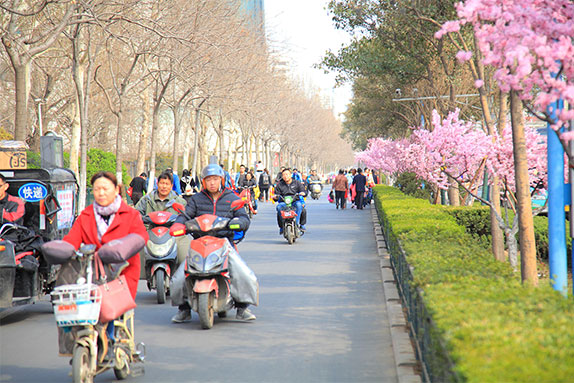
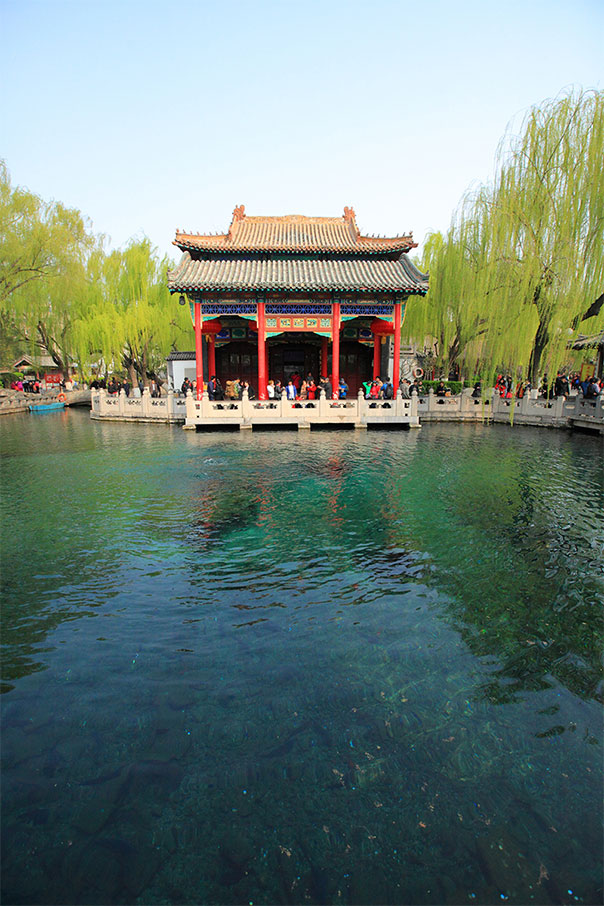 Jinan is also known as a city of spring. Baotu Spring Park is a famous sightseeing spot with springs fed by groundwater.
Jinan is also known as a city of spring. Baotu Spring Park is a famous sightseeing spot with springs fed by groundwater.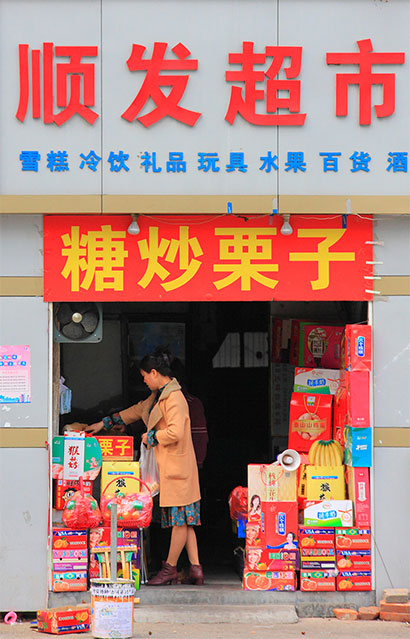
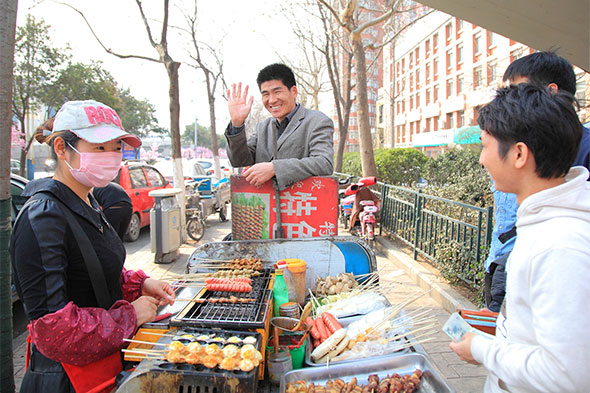
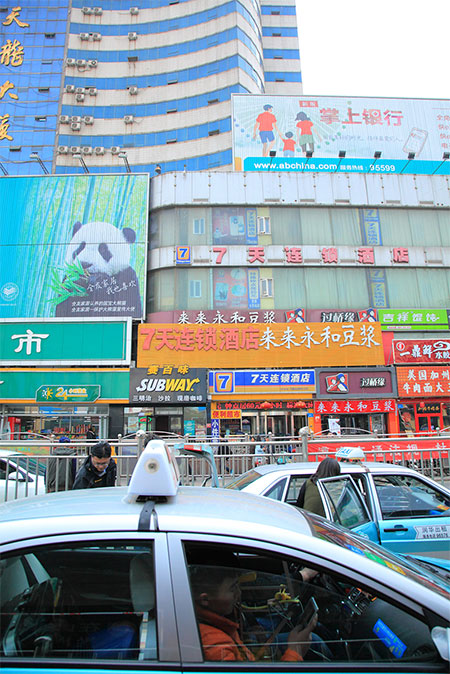
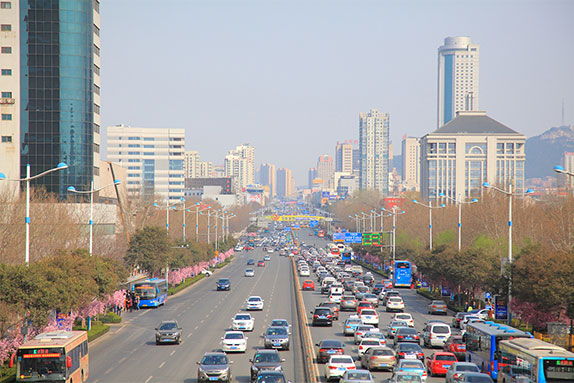
Sungkyunkwan University (Korea)
Professors are very friendly!
The professors here are noted for being caring and gentle towards students and they teach with courtesy. They also listen to students empathically to help them concentrate on their studies without concerns.
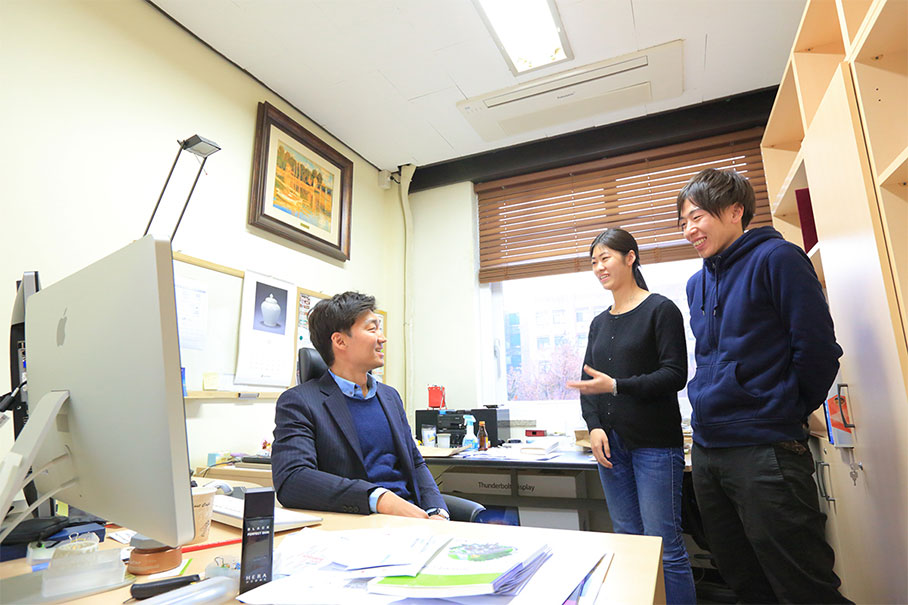 Let’s talk with Prof. Seunghee Park, an associate professor of Environmental Engineering.
Let’s talk with Prof. Seunghee Park, an associate professor of Environmental Engineering.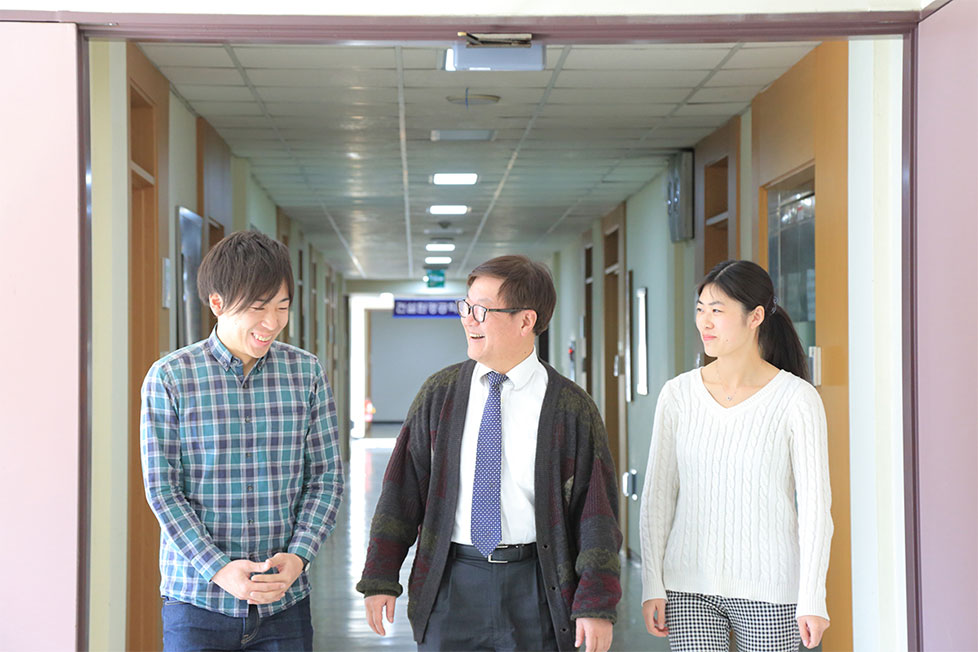
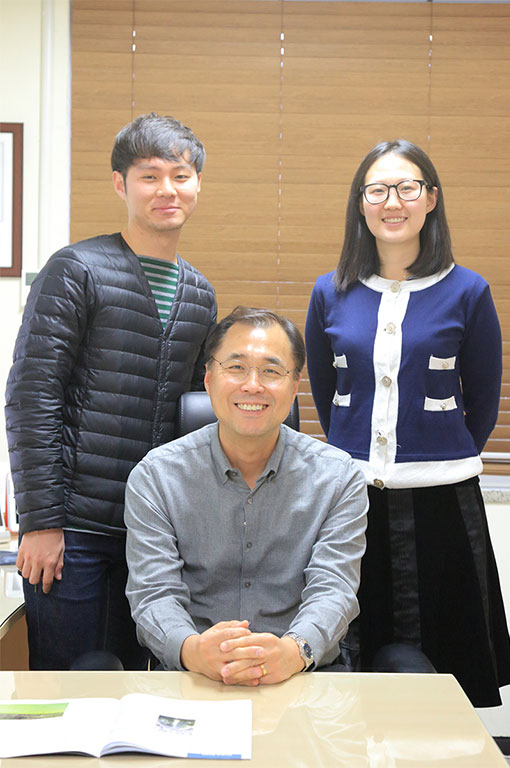 Associate Prof. AM JANG as well as the students who have experience of studying at Nagasaki University will support your student life.
Associate Prof. AM JANG as well as the students who have experience of studying at Nagasaki University will support your student life.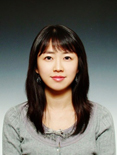 I’m HYANMI LEE, acting as a bridge between Nagasaki University and Sungkyunkwan University
I’m HYANMI LEE, acting as a bridge between Nagasaki University and Sungkyunkwan University I’m LEE GYUMIN, person in charge of international exchange at Sungkyunkwan University. Nice to meet you!
I’m LEE GYUMIN, person in charge of international exchange at Sungkyunkwan University. Nice to meet you!Various learning opportunities are available, from engineering research to Korean language lessons.
Being one of the top 10 private universities in Korea, the university offers a wide range of lectures from 9 am to 3 pm. International students can also take Korean lessons, which will make their daily lives easier.
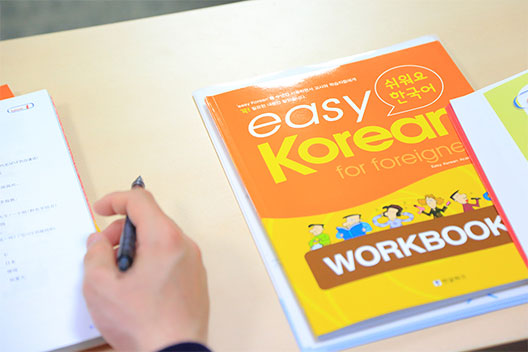
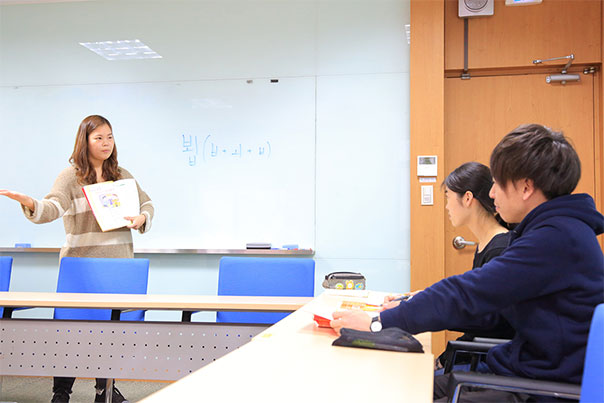 We have to learn Korean alphabet!
We have to learn Korean alphabet!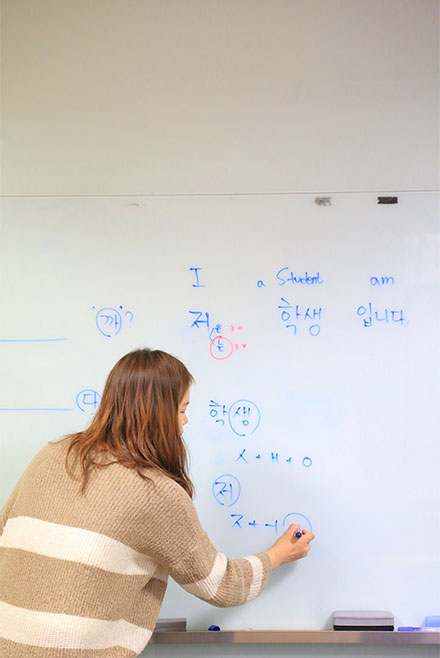 Students can take one-on-one lessons.
Students can take one-on-one lessons.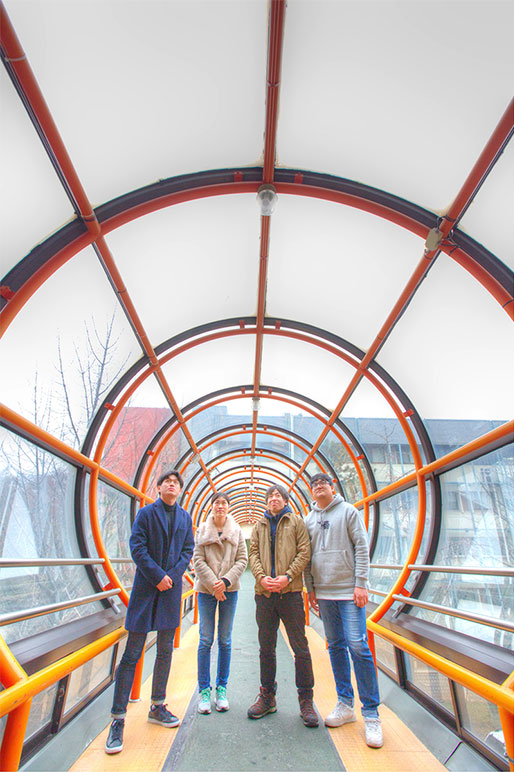
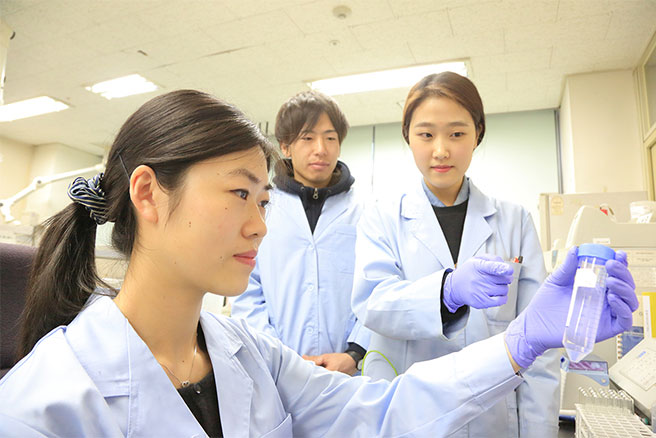
 Let’s go and see the laboratory!
Let’s go and see the laboratory!Enjoy Korean dishes!
Suwon Campus has three cafeterias, offering various items. Today’s dish is Bibimbap, a popular Korean food! The cafeterias provide large and comfortable space.
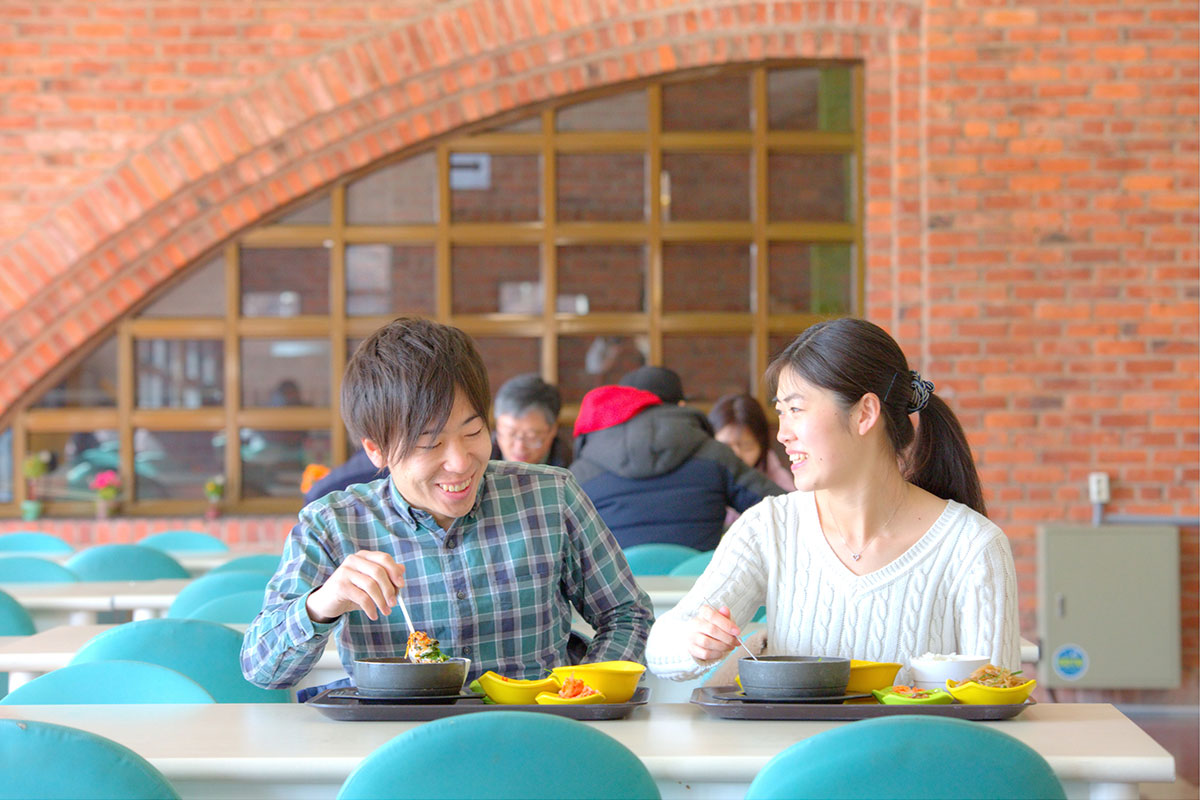
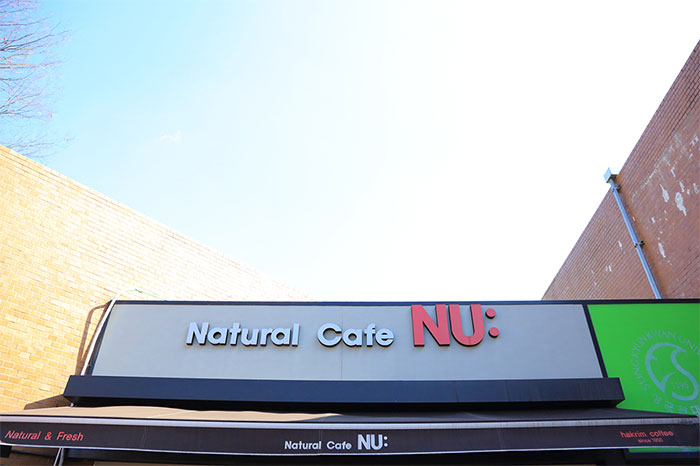 The campus also has several cafeterias for take-out.
The campus also has several cafeterias for take-out.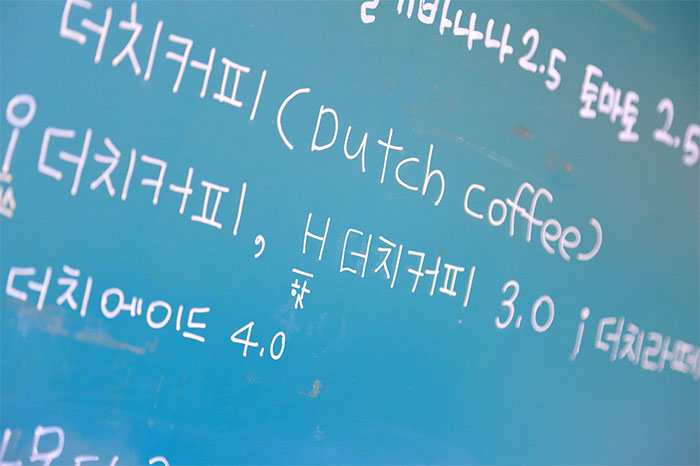 Let’s take a break after lunch.
Let’s take a break after lunch.Let’s take a look at the Samsung Library!
This huge library with seven floors above the ground and one floor under the ground is a symbol of the Suwon Campus. Students spend their after-class hours studying here.
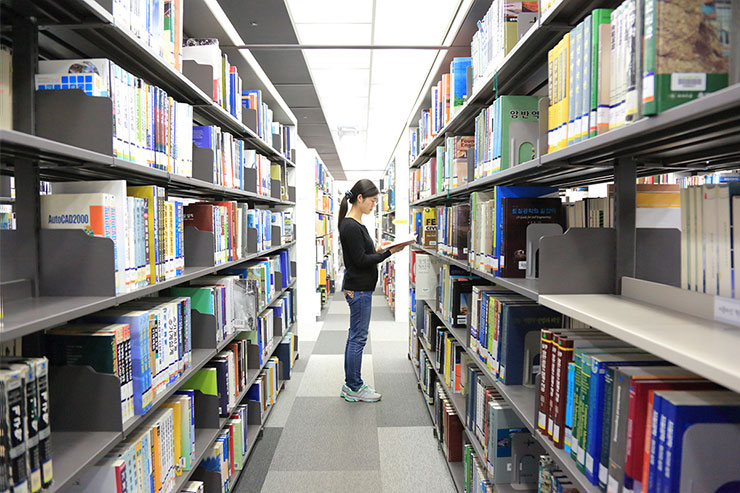
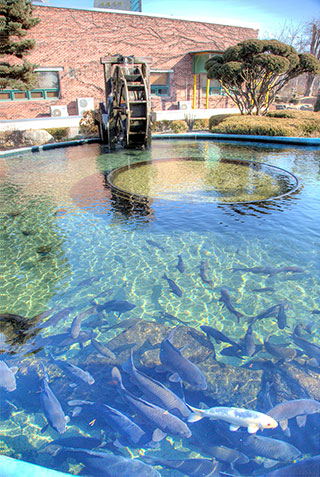
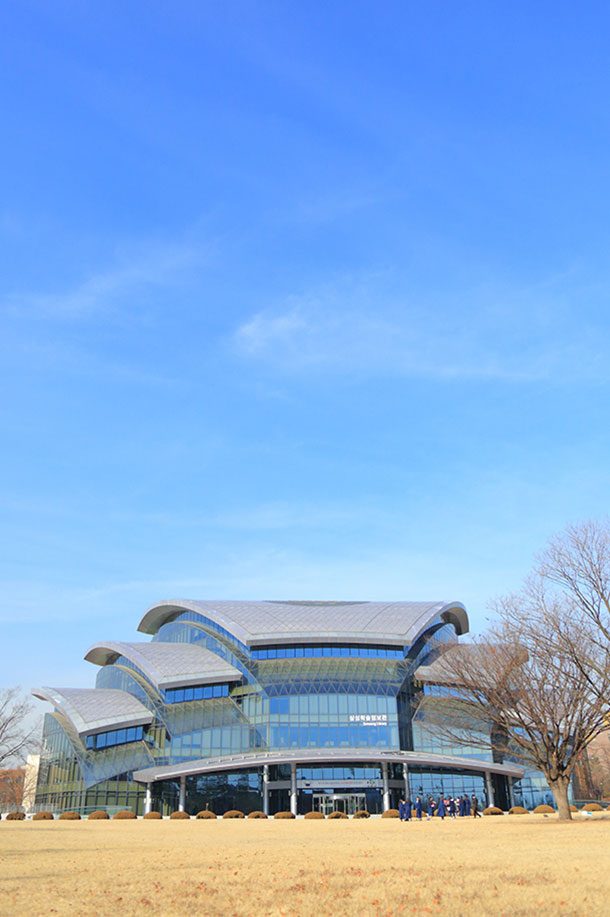 It looks like a huge robot.
It looks like a huge robot.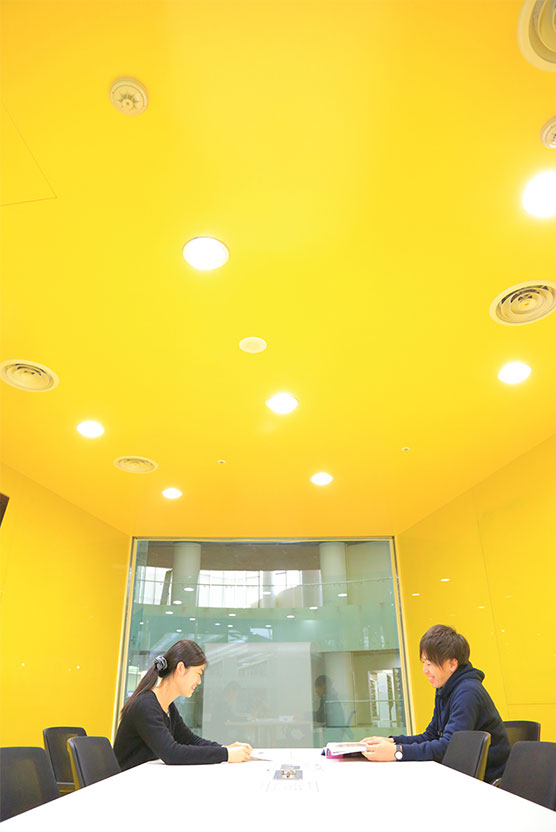 This is a private room, stylishly colored in yellow. It also has a cafeteria on the top floor.
This is a private room, stylishly colored in yellow. It also has a cafeteria on the top floor.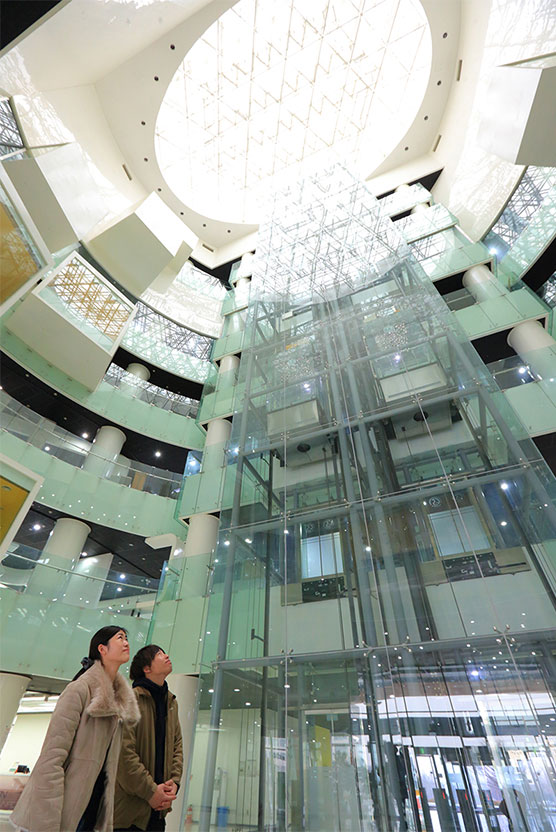 The campus also has facilities such as hospital, hair salon, post office, stationery shop and bank.
The campus also has facilities such as hospital, hair salon, post office, stationery shop and bank.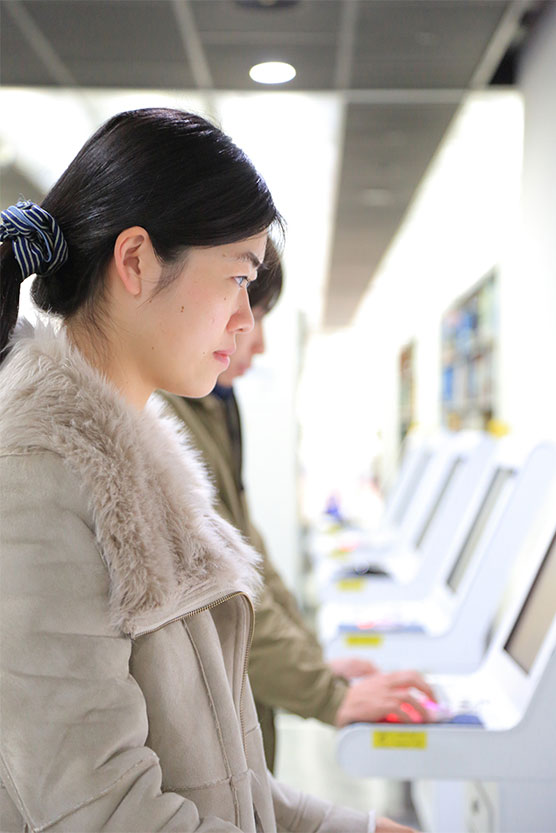 Search service is available at the entrance of the library.
Search service is available at the entrance of the library.The dormitory accommodates 2,000 students. The number of rooms as well as their equipment and facilities are among the highest and best in Korea!
The dorm has three types of rooms; for two persons, four persons, and six persons. An attendant is on duty 24 hours a day. It is equipped with ample facilities including cafeteria, laundry machines, and fitness rooms (2000 yen per month), just like a guest house!
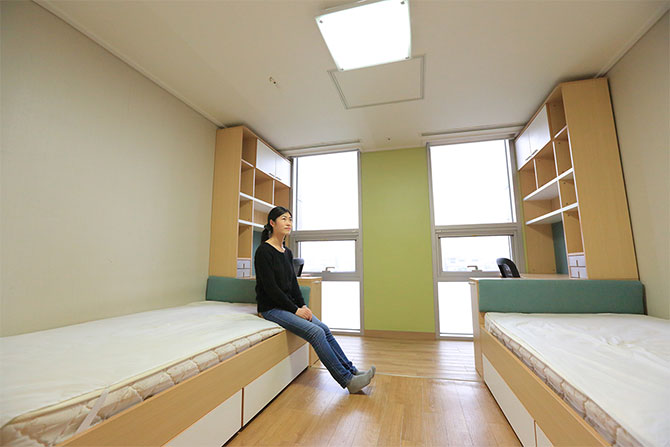 A room for two persons is equipped with a toilet and shower!
A room for two persons is equipped with a toilet and shower!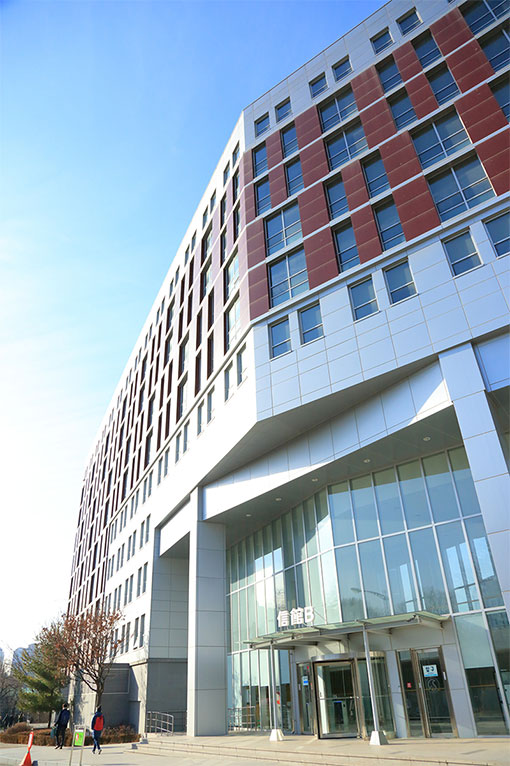 Building B, which was newly constructed in 2009.
Building B, which was newly constructed in 2009.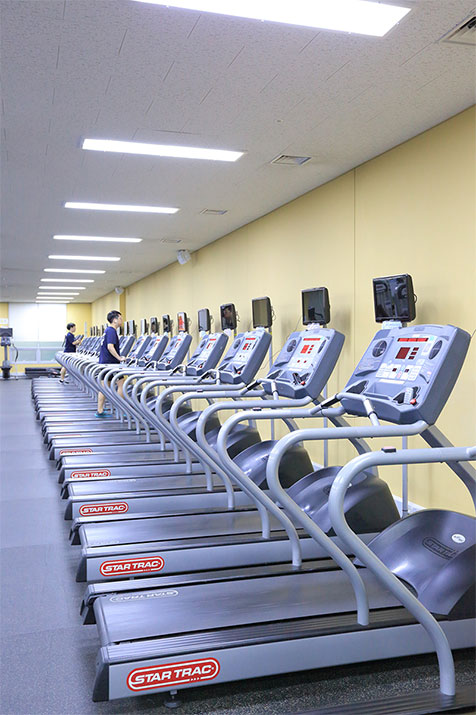 The gym has a lot of running machines!
The gym has a lot of running machines!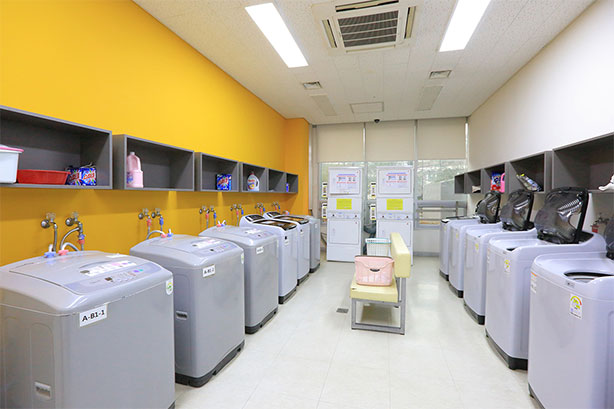 Washing and drying machines are available!
Washing and drying machines are available!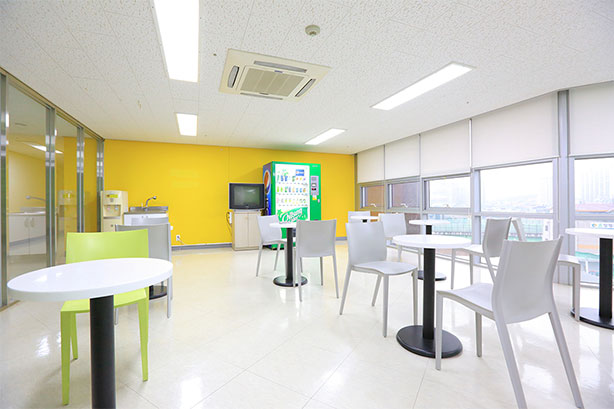 Each floor has a common room with TV and water server (for cold and hot)
Each floor has a common room with TV and water server (for cold and hot)exchange
Programs to experience Korean culture
At Korea House in Seoul, you can try on Korean traditional costume, Hanbok, and cook Bibimbap. I enjoyed them with other exchange students.
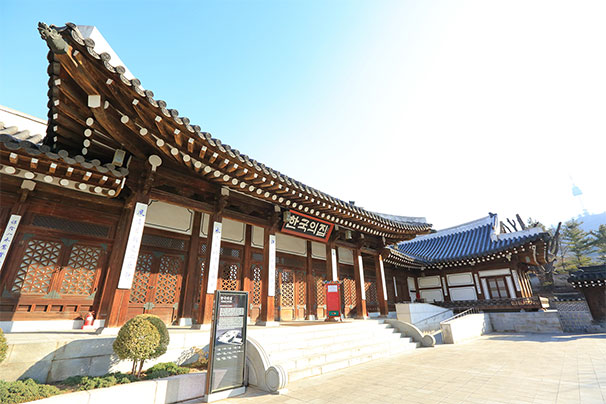
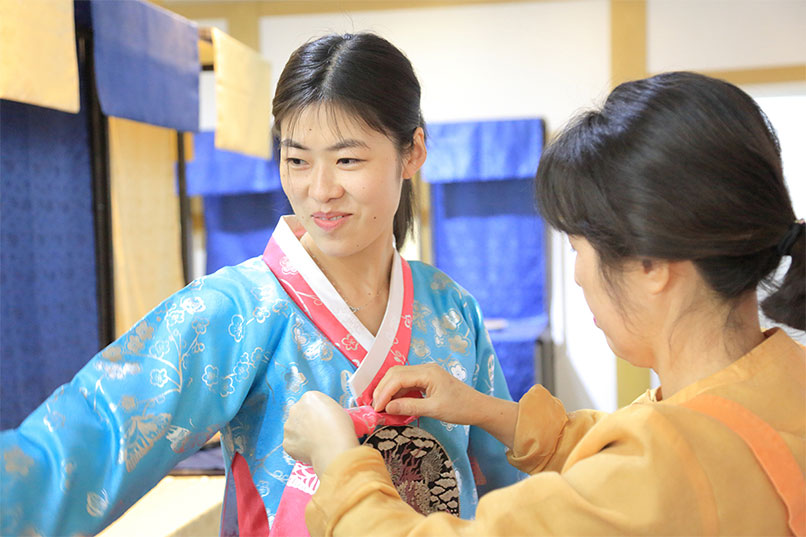 The colors of Korean costumes are beautiful!
The colors of Korean costumes are beautiful!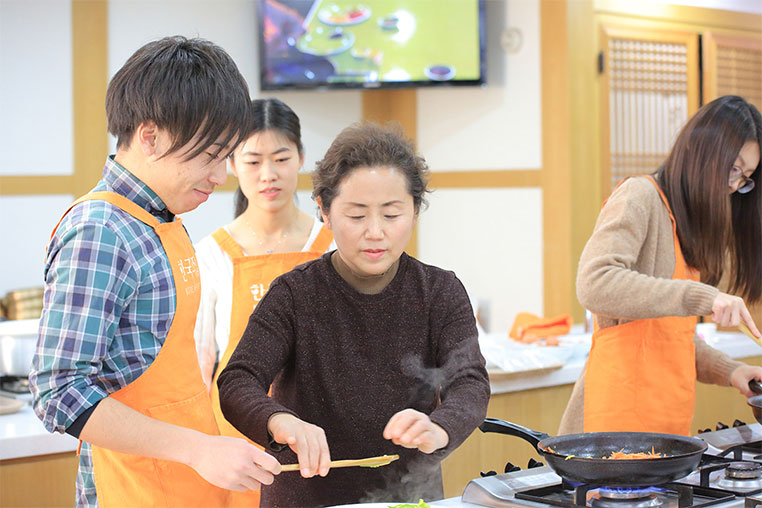 We learnt how to cook Bibimbap from Eomeoni (mother in Korea).
We learnt how to cook Bibimbap from Eomeoni (mother in Korea). 完成!
完成!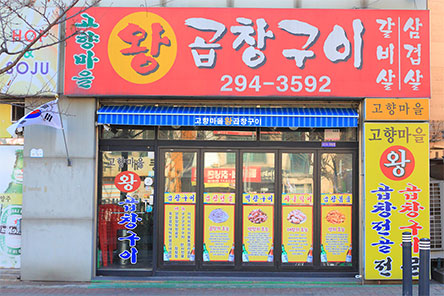
Campus
Visit food courts and bars and enjoy local dining in Korea.
You can walk straight out of the back gate onto the downtown area, where you will find places to eat and drink, convenience stores and so on. The campus is conveniently located with a big supermarket and a subway station nearby.
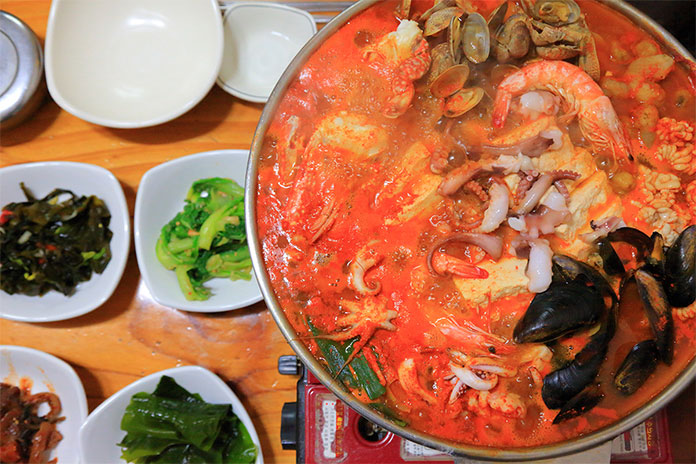 Jjigae hot pot, or Korean kimchi stew with seafood (crabs, squids, shrimps and octopuses), is the best.
Jjigae hot pot, or Korean kimchi stew with seafood (crabs, squids, shrimps and octopuses), is the best.